|
The material on this website is intended for educational use only and may not be reproduced for commercial purposes without express permission from the appropriate copyright holder.
Le contenu de ce site Web est destiné à des fins pédagogiques seulement et ne peut être reproduit à des fins commerciales à moins d'en avoir obtenu la permission du titulaire du droit d'auteur approprié.
Maps showing the location of First Nations
http://firstpeoplesofcanada.com/fp_groups/fp_wf1.html
Rooted in Resilience
Long before Confederation, Indigenous people lived under their own complex system of rights, rules, and responsibilities.
Written by Joanne DeCosse
June 1, 2017
http://www.canadashistory.ca/Explore/First-Nations,-Inuit-Metis/Rooted-in-Resilience
"New France, the Hudson's Bay Company and the North West Company consciously built their place here on the indigenous ideas of mutual dependency and partnership."
John Ralston Saul, A Fair Country
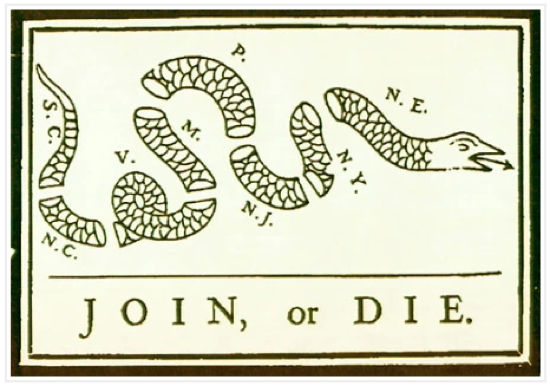
Benjamin Franklin, Pennsylvania Gazette, 9 May 1754
"The Northwest Company was the forerunner of Confederation and it was built on the work of the French voyageur, the contribution of the Indians, especially the canoe, Indian corn, and pemmican, and the organizing ability of Anglo-American merchants."
Harold Adams Innis
"The War of 1812 was the beginning of the process that led to Confederation. In the face of a common foe, the provinces of British North America developed a sense of similarity, and realized they had shared ideas and values."
Major John Grodzinski, Globe and Mail, 10 March 2012
"To us except the loss of prestige (no slight one I admit), the loss of Canada would be the loss of little but a source of heavy expense and great anxiety."
Lord Grey to Lord Elgin, 1847?
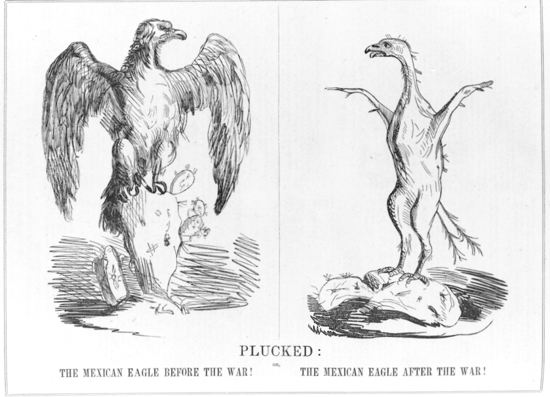
The Mexican Eagle before and after the War! Yankee Doodle, 15 May 1847
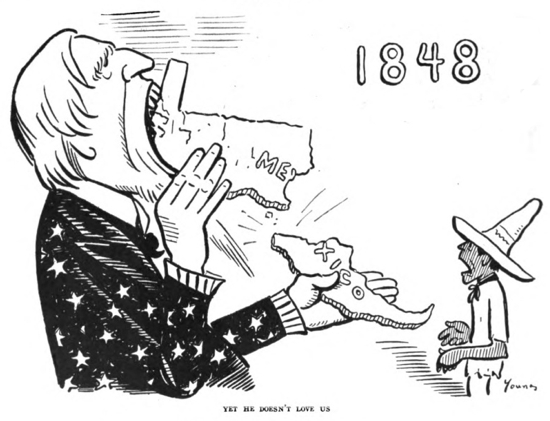
Art Young, Life, New York, 26 January 1899
"The term Manifest Destiny was first used in 1845 by New York City journalist John Louis O’Sullivan. He used the term in the context of America’s annexation of the Republic of Texas. Manifest Destiny represented the idea that it was America’s right — its destiny, in fact — to expand across all of North America."
The Canadian Enclyopedia
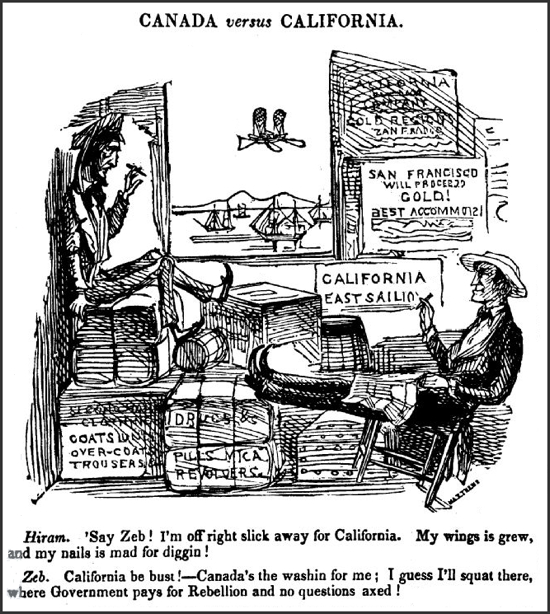
Punch in Canada, 14 April 1849
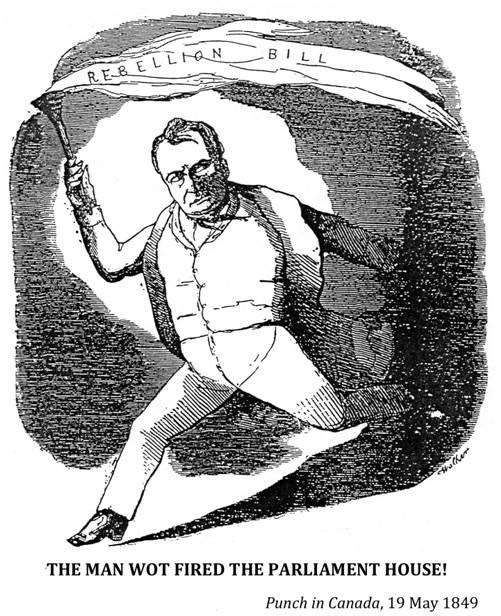
Louis Lafontaine, the head of the government in 1849, is shown carrying the torch. The Tories were upset when his government passed the Rebellion Losses Bill. They set fire to the Parliament buildings in Montreal on April 25 and advocated annexation to the United States.

Ben Holmes was a member of parliament who signed the annexation manifesto in 1849.
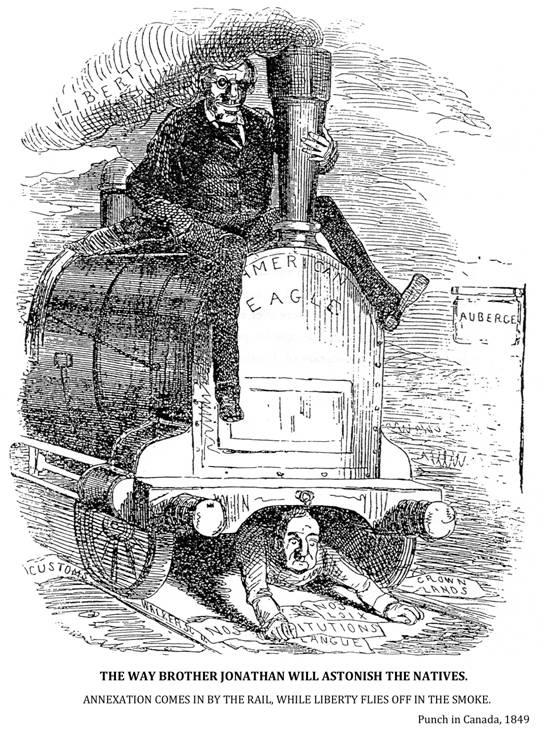
Brother Jonathan [the US] sits on top of the annexationist train, while Louis Joseph Papineau [French Canada] is underneath.
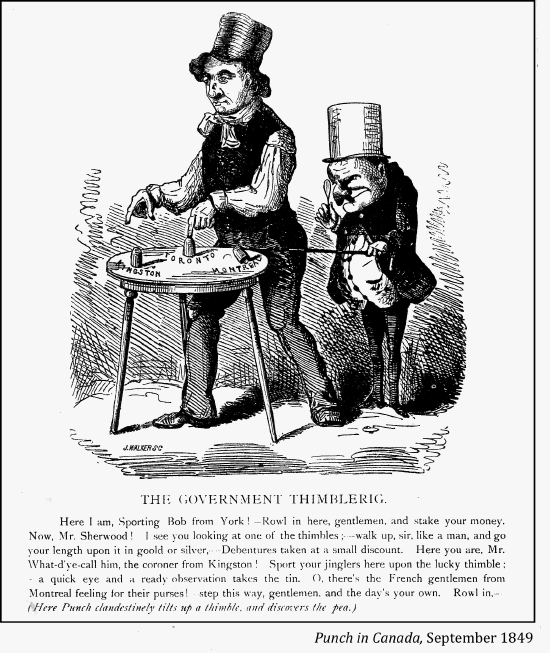
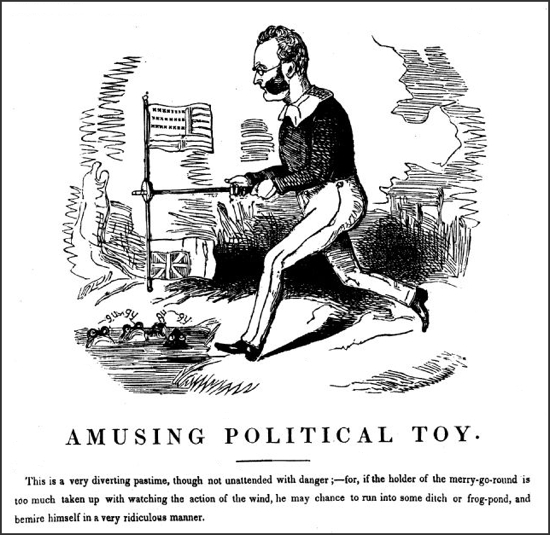
Punch in Canada, 15 November 1849
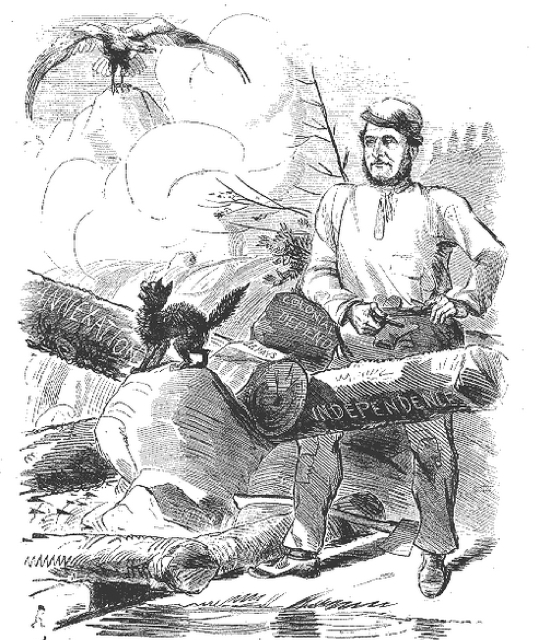
WAITING FOR THE CAT TO JUMP!
MR. HOLTON: "Drat the cat: I can't do anything till I see how she jumps."
Luther Hamilton Holton, John Henry Walker, LAC

"Representation by population. Justice for Upper Canada! While Upper Canada has a larger population by one hundred and fifty thousand than Lower Canada, and contributes more than double the amount of taxation to the general revenue, Lower Canada has an equal number of representatives in parliament."
Toronto Globe, 1 October 1853
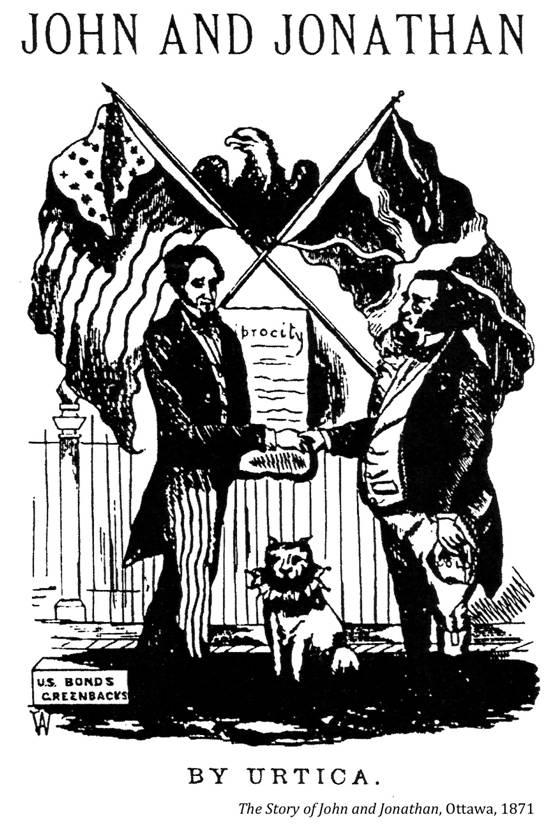
A cartoon about the 1854 Reciprocity Treaty
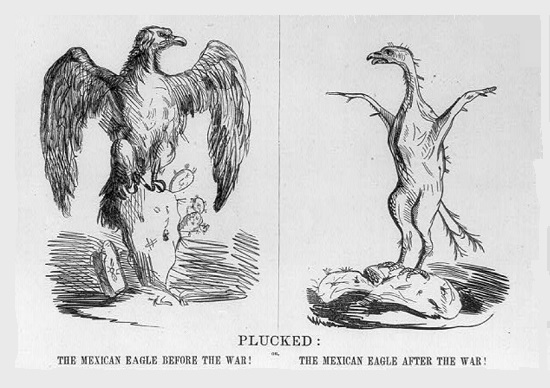
Yankee Doodle, 15 May 1847 LC200269524
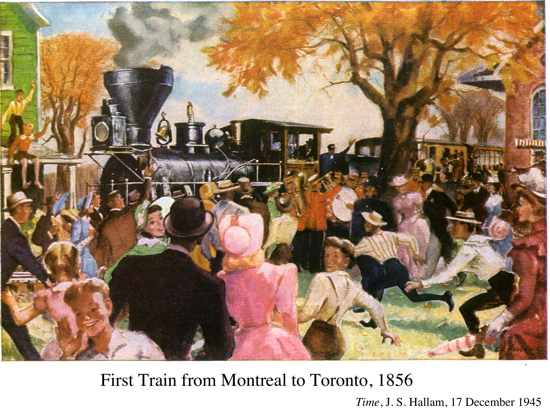
"If their city [Toronto] is ever to be made great – if it is ever to rise above the rank of a fifth-rate American town – it must be by the development of the great British territory lying to the north and west."
Globe and Mail, 26 December 1856
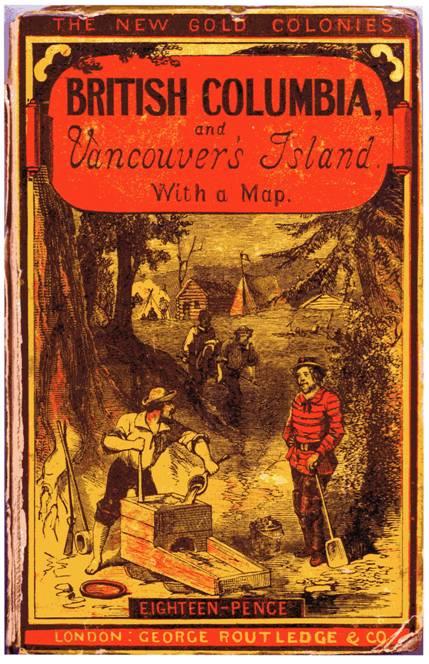
Rare books and special collections, UBC, book published in 1858
"Once constitutional authority was established in November, 1858, and with the advent of a judge like Matthew Baillie Begbie, all elements of the population came to have a healthy respect for British justice and realized that there was no necessity for the "six shooter," the bowie knife, the vigilates, or the posse in British Columbia."
Willard E. Ireland
"My deliberate opinion is that the question is simply one of Confederation with each other or ultimate absorption in the United States, and every difficulty placed in the way of the former is an argument in favour of those who desire the latter."
Sir Alexander Tilloch Galt, Letter, 22 November 1858
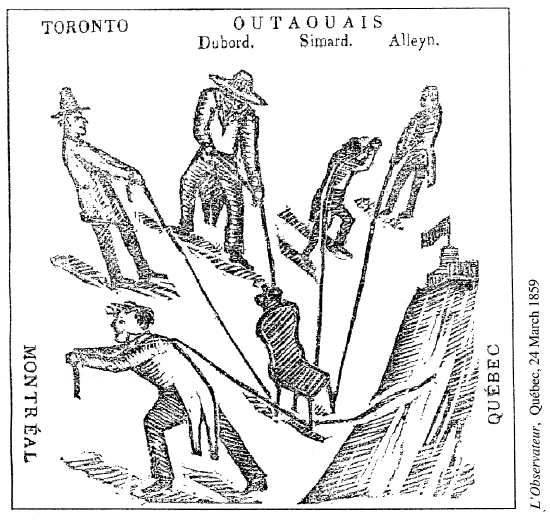
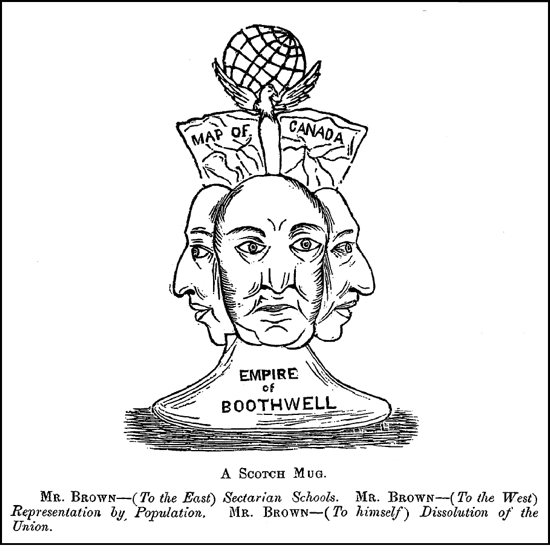
The Poker, Toronto, 23 July 1859
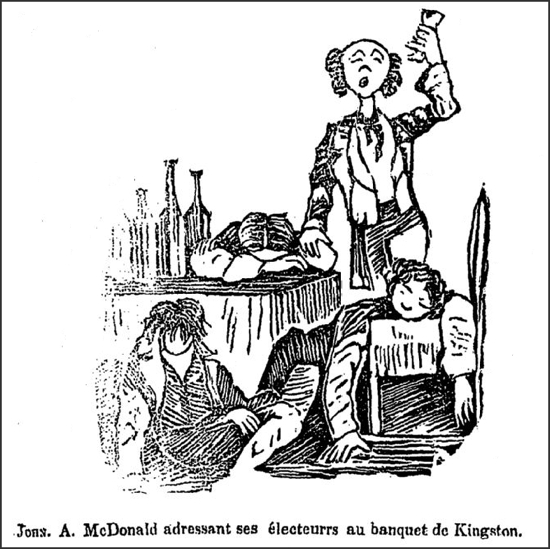
L'observateur journal critique, Québec, 18 August 1859
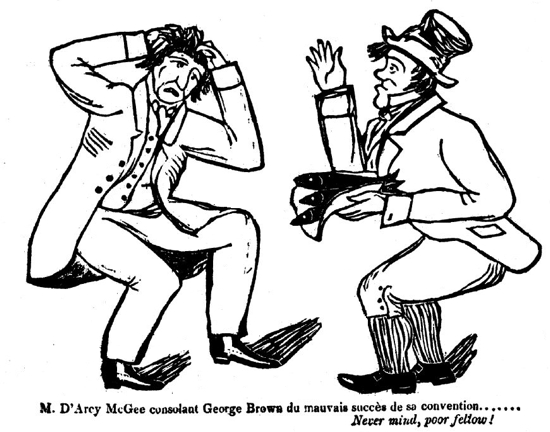
Le bourru, Montréal, 21 January 1860
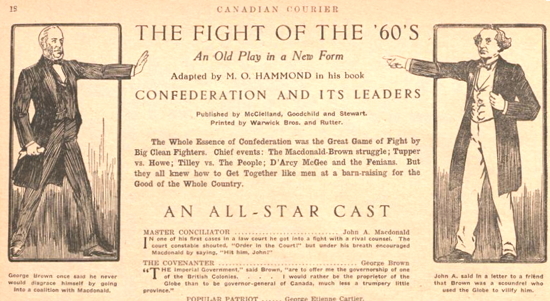
The Canadian Courier, Toronto, 14 July 1917
"...a sub-arctic lumber-village converted by royal mandate into a political cockpit..."
Goldwin Smith, 1892
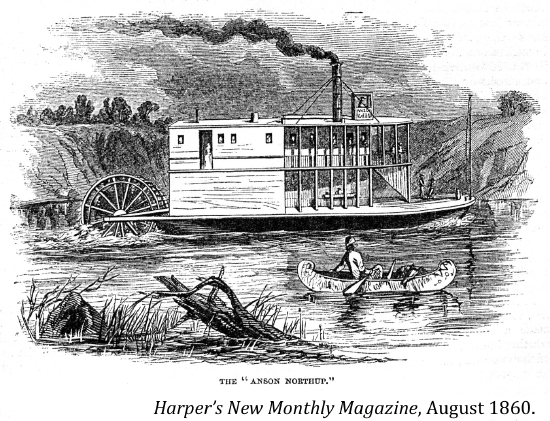
[The first steamboat on the Red River reached Fort Garry in June 1859. Trade with the United States provided by the Red River cart and steamboat were more efficient than the Hudson's Bay route. Paddle wheelers started operating to Red River from the United States. By 1870 steam powered vessels were operating on the major waterways of the west.]
"I see in the not remote distance one great nationality, bound, like the shield of Achilles, by the blue of the ocean.I see it quartered into many communities, each disposing of its own internal affairs, but all bound together by free institutions, free intercourse, free commerce. I see, within the round of that shield, the peaks of the western mountains and the crests of the eastern waves. The winding Assiniboine, the five-fold lakes, the St. Lawrence, the Ottawa, the Saguenay, the St. John, the Basin of Minas, by all these flowing waters in all the waters they fertilize. In all the cities they visit in their courses, I see a generation of industrious, contented moral men, free in name and in fact–men capable of maintaining, in peace and in war, a constitution worthy of such a country."
Thomas D'Arcy McGee, parliamentary debate, 1860
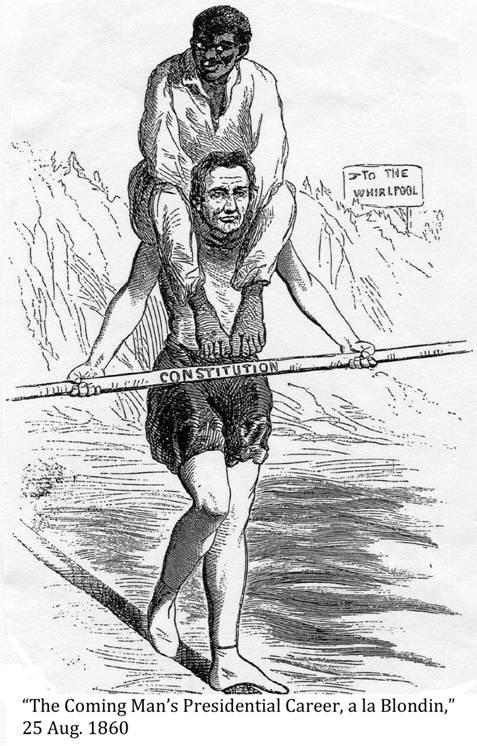
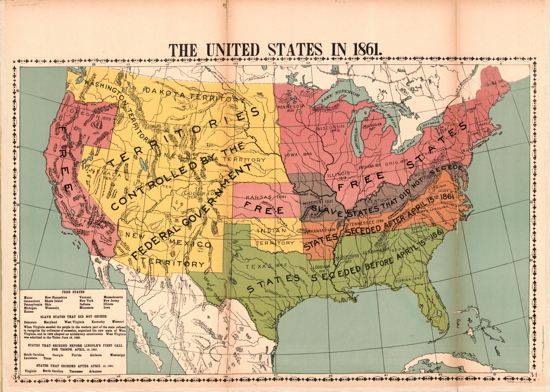
McConnell's Historical maps of the United States, James Mcconnell, Public Domain, via Wikimedia Commons, LOC 2009581130-33
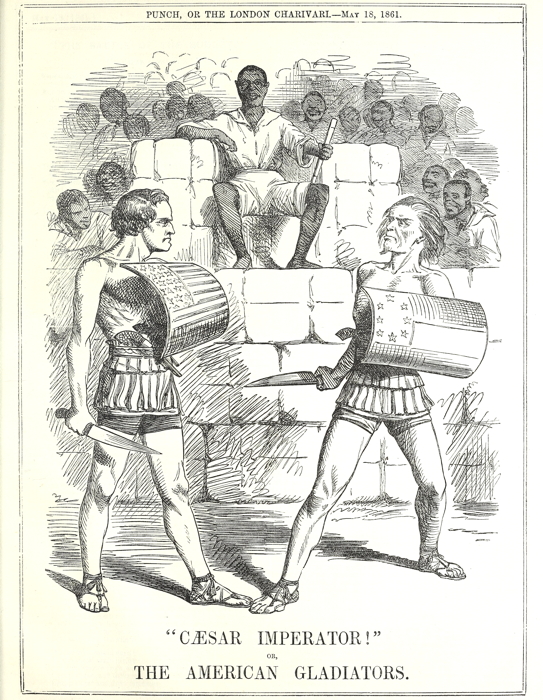
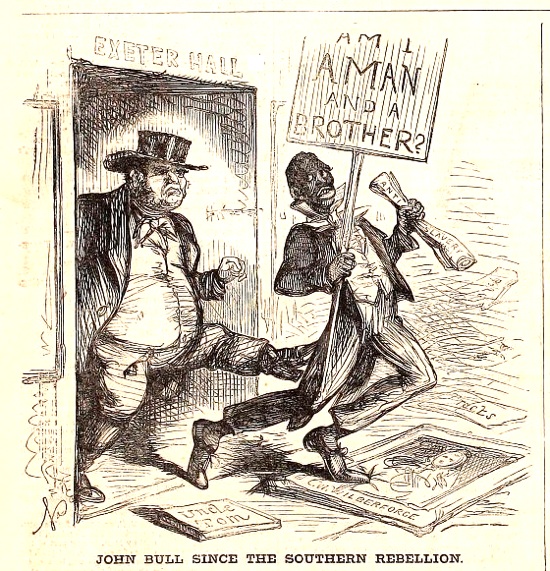
Harper's Weekly, New York, 28 September 1861
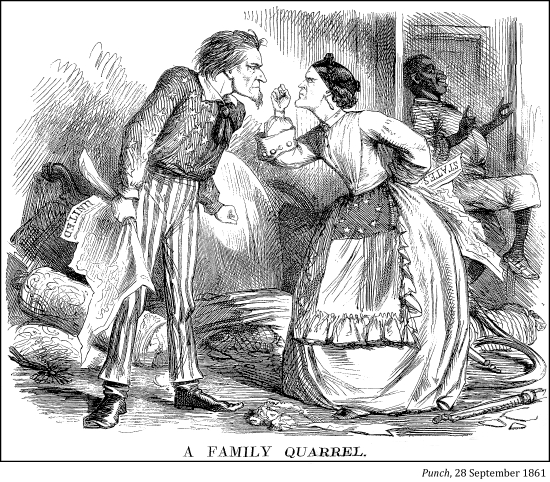
"That shot fired at Fort Sumter, on the 12th of April, 1861, had a message for the north as well as for the south. . . [it] was the signal gun of a new epoch for North America, which told the people of Canada . . . to sleep no more except on their arms, unless they desire to be overtaken and subjected."
Thomas D'Arcy McGee, 1861
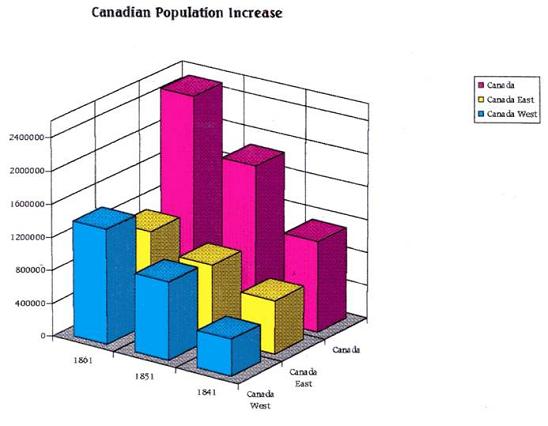
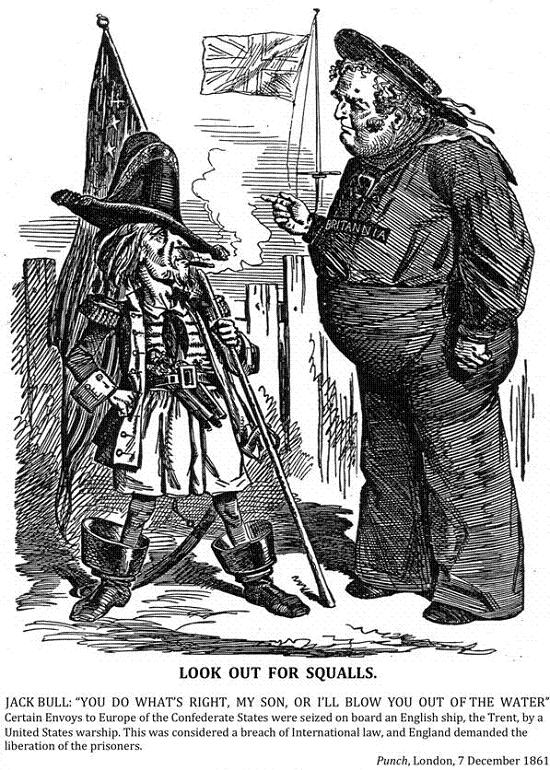
"So I look upon Rupert’s Land and Canada, and see how an ingenious people, and a capable, enlightened government, are occupied with bridging rivers and making railroads and telegraphs to develop, organize and create and preserve the great British provinces of the north by the Great Lakes, the St. Lawrence and around the shores of Hudson’s Bay, and I am able to say, ‘It is very well you are building excellent states to be hereafter admitted to the American Union.’"
William H. Seward, 1861
"Secession first he would put down
Wholly and forever,
And afterwards from Britain's crown
He Canada would sever."
Sung to the tune of 'Yankee Doodle.'
"The fratricidal conflict now unhappily raging in the United States shows us the superiority of our institutions and the principle on which we are based. Long may that principle–the Monarchial principle– prevail in this land. Let there be 'No Looking to Washington."
John A. Macdonald, Address to the Electors of the City of Kingston, June 1861
"We must however endeavour to take warning by the defects in the Constitution of the United States, which are now so painfully made manifest [Civil War], and to form (if we succeed in a Federation) an efficient, central government." [i. e. senators appointed for life, federally appointed Lieutenant-Governors, federal right to disallow provincial legislation, federal control of residual powers and the banking system]
John A. Macdonald, 1861
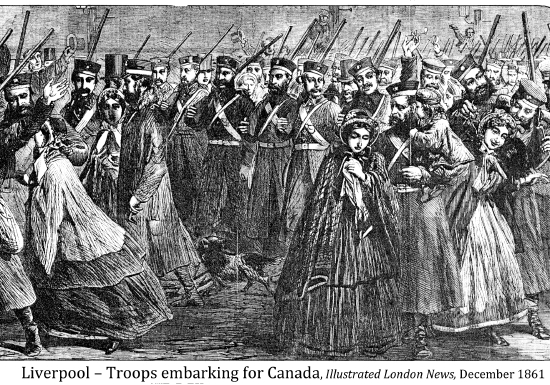
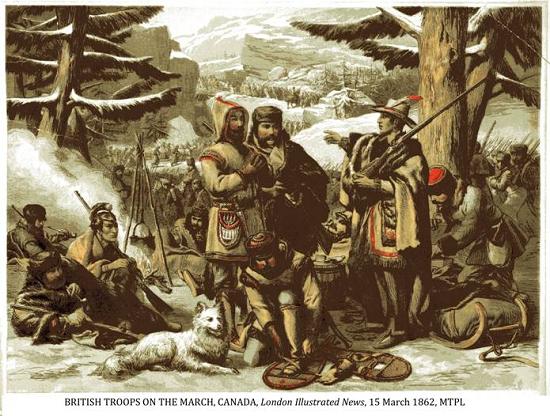
Take a Nova Scotian to Ottawa , away above tide-water, freeze him up for five months, where he cannot view the Atlantic, smell salt water, or see the sail of a ship, and the man will pine and die.
Joseph Howe, Nova Scotia
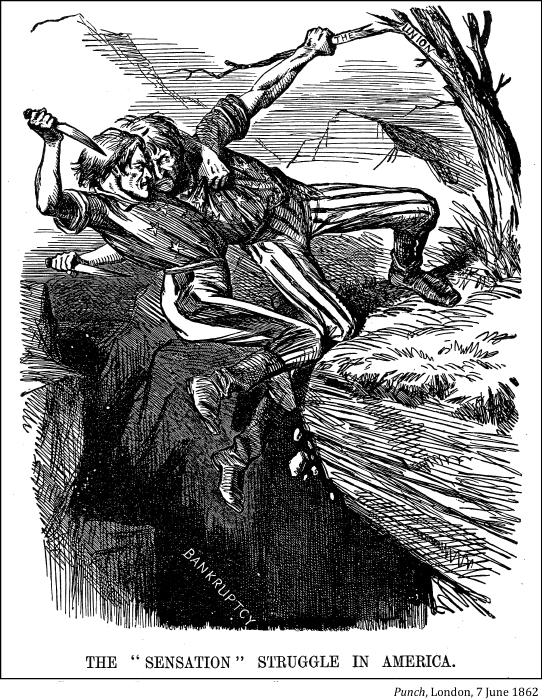
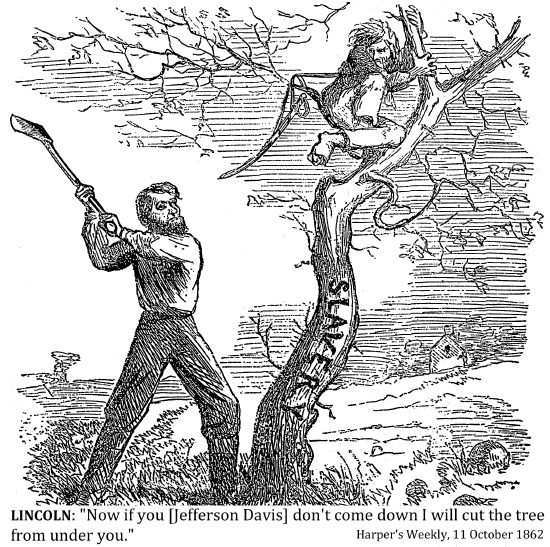
"In the event of any rupture between Great Britain and the United States . . . it must be born in mind that the risk of passing large bodies of men over [a road] during an inclement season . . . would be considerable, the delay unavoidably great, and the expense enormous, whereas if railway communications were once established, both troops and munitions of war could at all times be rapidly and safely transported to Canada, and mutual military operations would thereby be vastly facilitated."
Major General Charles Dolye, letter to the Duke of Newcastle, 16 October 1862
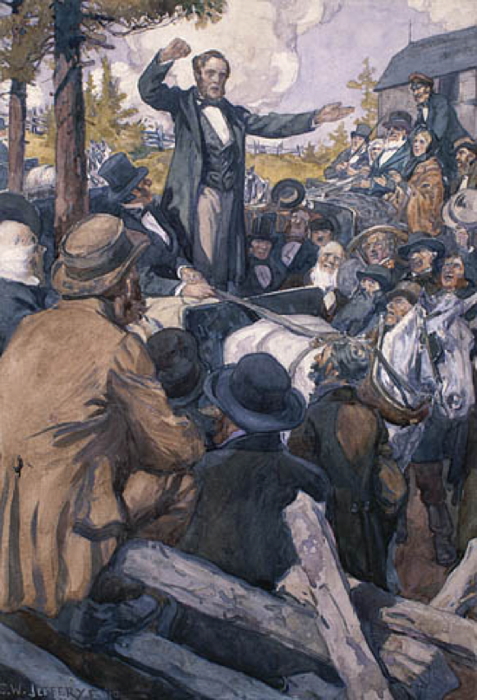
George Brown addressing an audience during an election campaign. George Brown s'adressant à la foule pendant une campagne électorale. LAC, 1972-26-1396, Charles William Jefferys ca. 1925
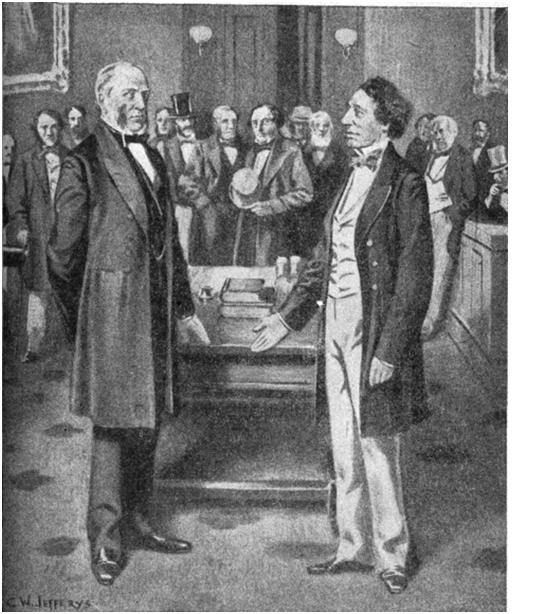
George Brown and Sir John A. Macdonald Meet to Inaugurate Confederation. C. W. Jefferys, 15 June 1864
"It is quite evident to me . . . that the U.S. government are resolved to do all they can, short of war, to get possession of the Western territory, and we must take immediate and vigorous steps to counteract them. "
Sir John A. Macdonald
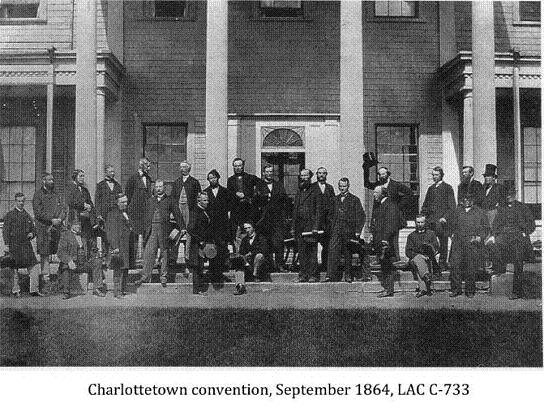
Convention at Charlottetown, P.E.I., of Delegates from the Legislatures of Canada, New Brunswick, Nova Scotia, and Prince Edward Island to take into consideration the Union of the British North American Colonies. Conférence à Charlottetown, Î.-P.É., de representatifs des corps législatives du Canada, Nouveau-Brunswick, Nouvelle-Écosse, et l'Île-du-Prince-Édouard pour considérer l'union des coloniesLAC, C-000733, G. P. Roberts, 11 September 1864, J. B. LIvernois 27 October 1864
"The relationship of the prairie west to the federal government was to be that of a colony."
Lewis G. Thomas
"Resolution 10. The North-West Territory, British Columbia and Vancouver shall be admitted into the Union on such terms and conditions as the Parliament of the Federated Provinces shall deem equitable, and as shall receive the assent of Her Majesty; and in the case of the Province of British Columbia or Vancouver, as shall be agreed to by the Legislature of such Province."
Quebec Act, October 1864
[The Fathers of Confederation saw a continent-wide Dominion as their manifest destiny.]
"Rest assured if we remain long as fragments, we shall be lost, but let us be united, and we shall be as rock which, unmoved by itself, flings back the waves that may be dashed upon it by the storm."
Thomas D'Arcy McGee, speech at Halifax, 1864
"Our river systems dictates our union, railroads and canals will strengthen these natural bonds."
Thomas D'Arcy McGee
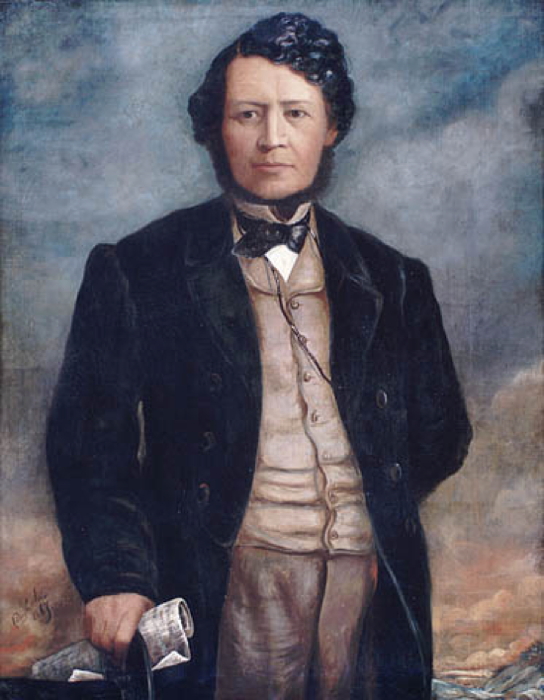
The Honorable Thomas D'Arcy McGee, LAC Acc. No. 1997-194-1, Denis Hurley, 1867
"There is no other instance on record of a colony peacefully remodeling its own constitution, such changes have been always the work of the parent state and not the colonists themselves. Canada is rightly setting the example of a new and better state of things."
George Brown, 26 August 1864
"I hope that we shall be able to produce a constitution which will set up a strong central government, able to defend itself against whatever threatens it, but which will also preserve the individuality of each province and protect its particular aspirations."
John A. Macdonald
"Cartier and I made eloquent speeches – of course – and whether as a result of our eloquence or of the goodness of our champagne, the ice became completely broken, the tongues of the delegates wagged merrily, and banns of matrimony between all the provinces of B.N.A. having been formally proclaimed and all manner of persons duly warned then and there to speak or forever after to hold their tongue – no man appeared to forbid the banns and the union was thereupon formally completed and proclaimed!"
George Brown, letter, 13 September 1864
"No man in his senses can support that the country can for a century to come be governed by a totally unfrenchified government. If a Lower Canadian British desires to conquer he must stoop to conquer. He must make friends with the French without sacrificing the status of his race or language, he must respect their nationality. Treat them as a faction and they become factious. Treat them as a nation and all will act as a free people generally do – generously."
John A. Macdonald
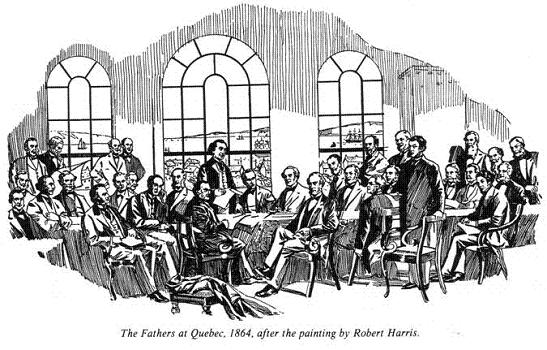
"The Iroquois League united five principal Indian nations . . . This model of several sovereign units united into one government presented precisely the solution to the problem confronting the writers of the US constitution [Confederation]. Today we call this a "federal" system in which each state [province] retains power over internal affairs and the national government regulates affairs common to all."
Jack Weatherford, Indian Givers
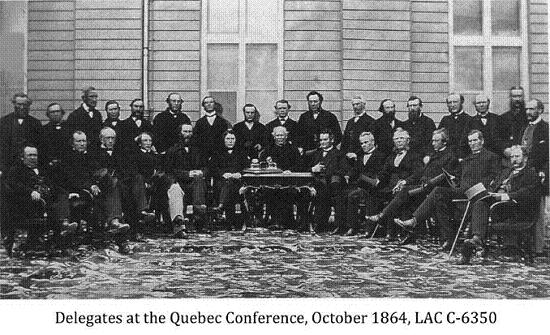
Les délégués des provinces à la conférence de la Confédération à Québec. The Delegates of the Provinces at the Quebec Confederation Conference. LAC, C-016588
"Then let us be firm and united
One country, one flag for us all;
United, our strength will be freedom
Divided, we each of us fall."
A toast given to Maritimers and Canadians in Montreal, 1864
"Gladstone said to me the other day: 'Canada is England's weakness, till the last British soldier is brought away and Canada left on her own. We cannot hold our own with the United States."
C. B. Adderley, British Minister for the Colonies, 1864
"The father of Confederation was deadlock."
Goldwin Smith
"The General [federal] Government shall secure, without delay, the completion of the Intercolonial Railway from Riviere-de-Loup, through New Brunswick, to Truro in Nova Scotia."
Lieut. Col. William Jervis, resolution submitted at the Quebec Conference, 10 October 1864
"In framing the constitution care should be taken to avoid the mistakes and weaknesses of the United States' system, the primary error of which was the reservation to the different states of all powers not delegated to the general government. We must reverse this process by establishing a strong central government to which shall belong all powers not specifically conferred on the provinces. Canada, in my opinion, is better off as she stands than she would be as a member of a confederacy composed of five sovereign states, which would be the result if the powers of the local governments were not defined. A strong central government is indispensible to the success of the experiment as we are trying."
Sir John A. Macdonald, 11 October 1864
Then let us be firm and united
One country, one flag for us all;
United our strength will be freedom
Divided, we each of us fall.
1864, dinner for Maritimers hosted by Cartier
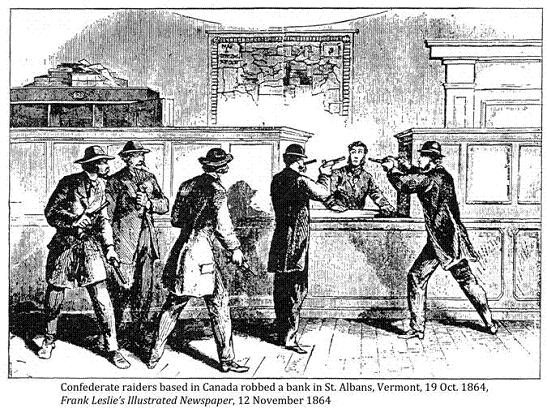
The United States was angry when Canadian courts freed the raiders.
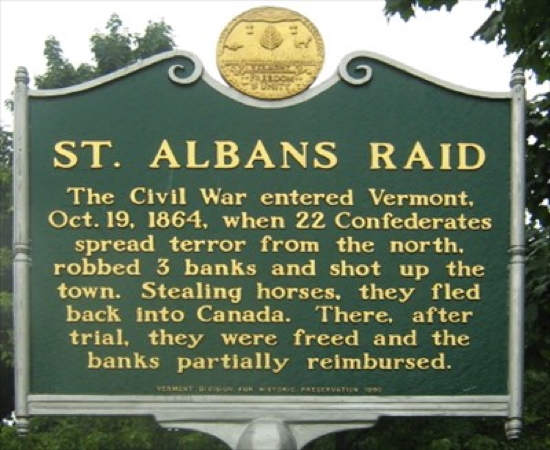
In retaliation for the St. Alban's raid the United States did not renew the Reciprocity Treaty in 1866

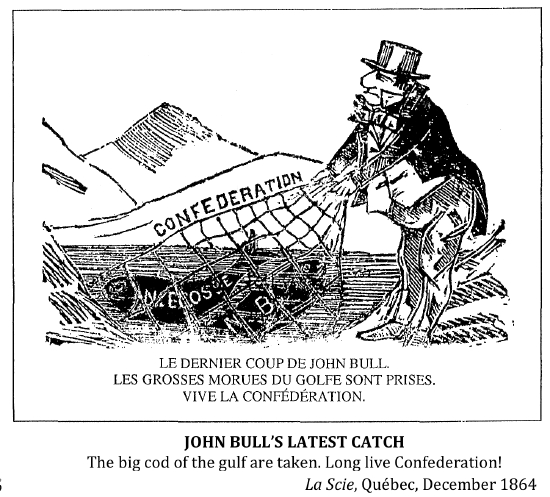
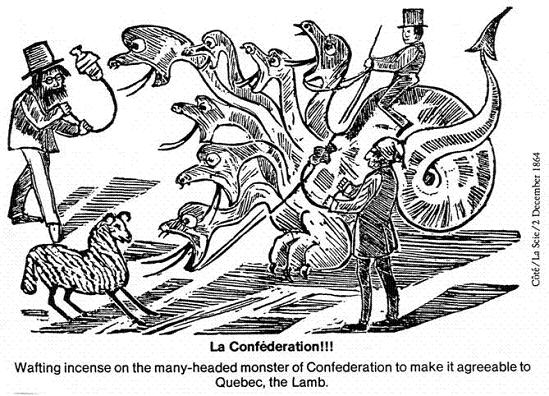
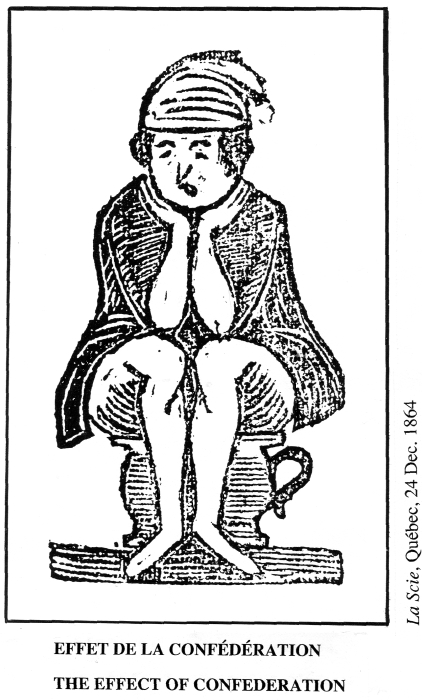
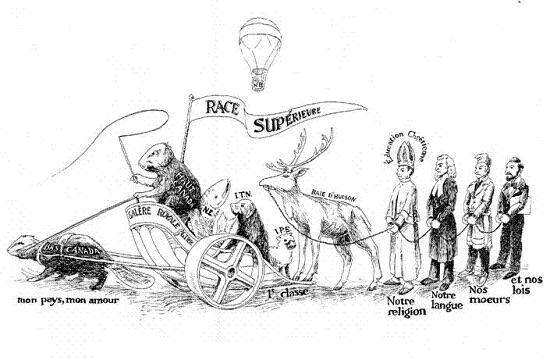
[left to right] My country, my love; Lower Canada; Grand Trunk Railway; Upper Canada; Nova Scotia; superior race; Newfoundland; Prince Edward Island; Hudson Bay; our religion; our language; our customs; our laws.
Based on La Confédération Quadrille Danse Nationale , Montréal, 1865
"I would be quite willing, personally, to leave that whole [Rupert's Land] country a wilderness for the next half century, but I fear if Englishmen do not go there, Yankees will."
John A. Macdonald, 1865
"Everyone of the colonies we now propose to re-unite under one rule . . . were once before united as New France."
Thomas D'Arcy McGee, 1865
"The question is reduced to this: we must either have a British North American federation or else be absorbed into the American federation."
George Étienne Cartier, 1865
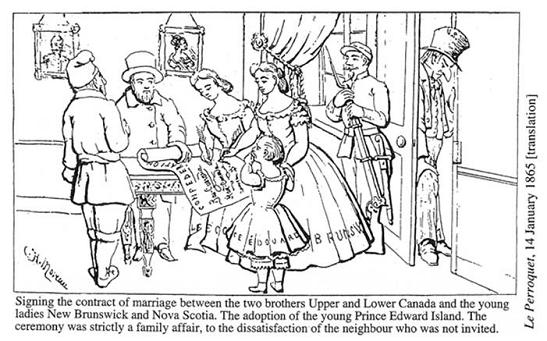
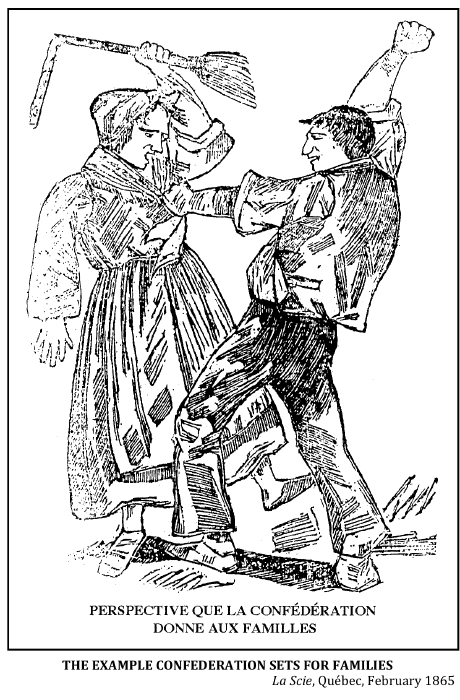
They [the United States] coveted Florida, and seized it; they coveted Louisiana, and purchased it; they coveted Texas and stole it; and then they picked a quarrel with Mexico, which ended with their getting California . . . had we not the strong arm of England over us, we would not now have had a separate existence.
Thomas D'Arcy McGee, 9 February 1865
"By the endless variety of its tints the rainbow will give an excellent idea of the diversity of races, religions, sentiments and interests of the different parts of Confederation. By its slender and elongated form, the rainbow would afford a perfect representation of the geographical configuration of the Confederation."
Sir Henri-Gustave Joly de Lotbinière, speech, 20 February 1865
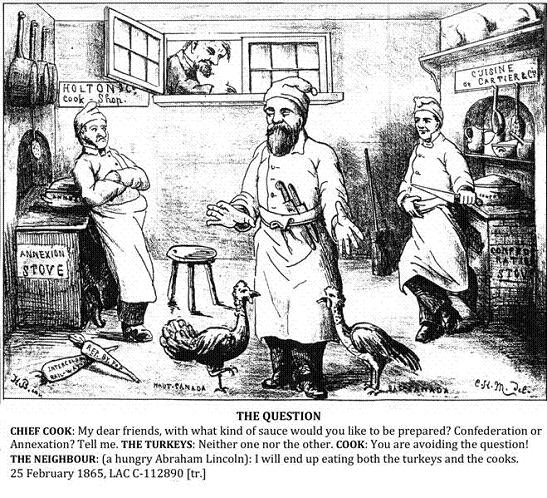
La Question. LAC, C-112890, Le Perroquet, Montréal, 25 février 1865

Ce bon Mr. Lincoln. LAC, C-112901 Charles Henri Moreau, Le Perroquet, Montréal, 15 Avril 1865
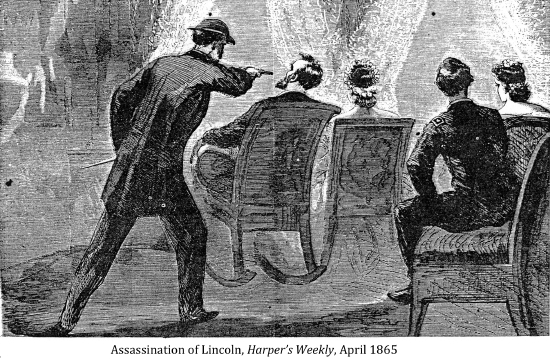
"The question is reduced to this: we must either have a British North American federation or else be absorbed into the American federation."
George Etienne Cartier, Confederation Debates, 1865
"In the Upper House, the controlling and regulating, but not initiating branch, we have the sober second thought in legislation."
John A. Macdonald, 1865
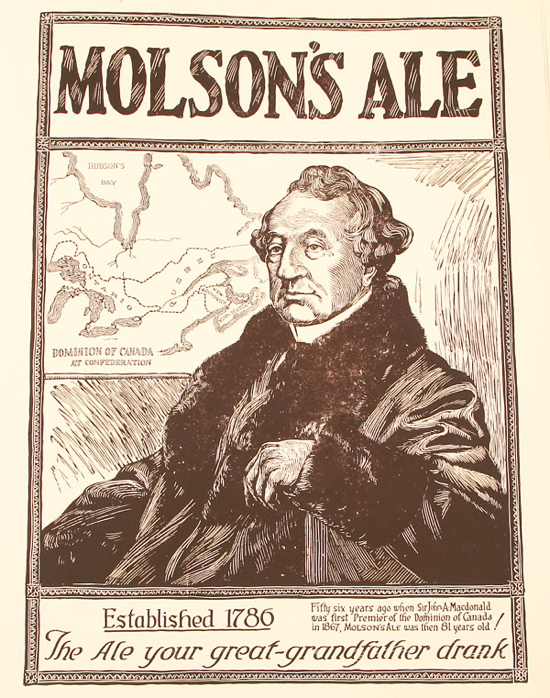
Molson's Ale, Sir John A. Macdonald. LAC Acc. No. 1996-278-2.34 Source: Molson Companies Limited, Montreal, Quebec. ca. 1924
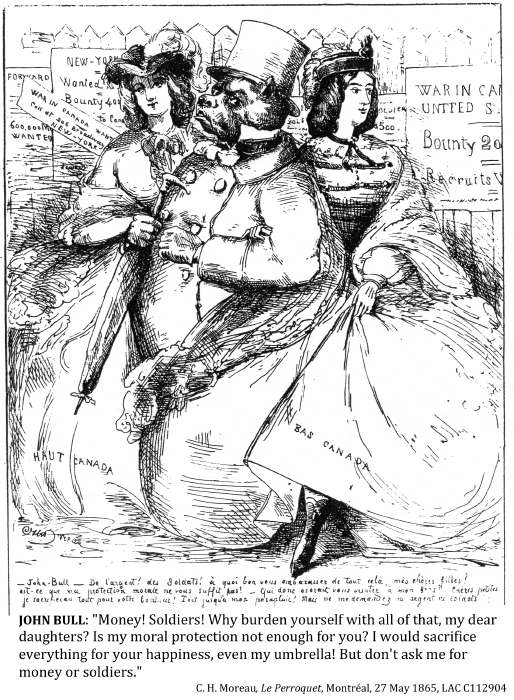
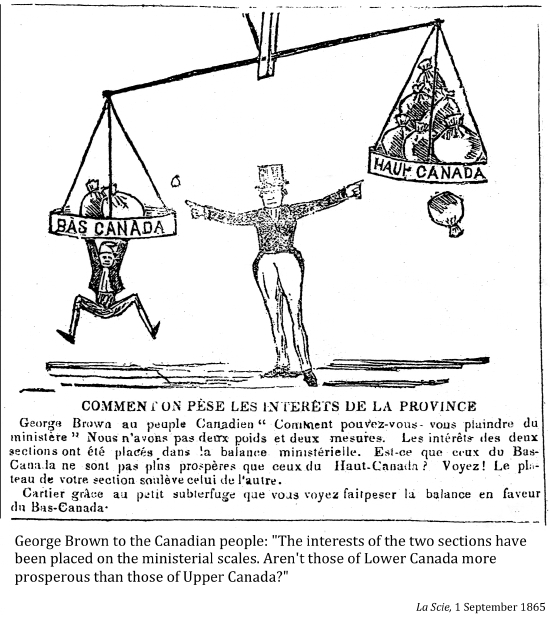
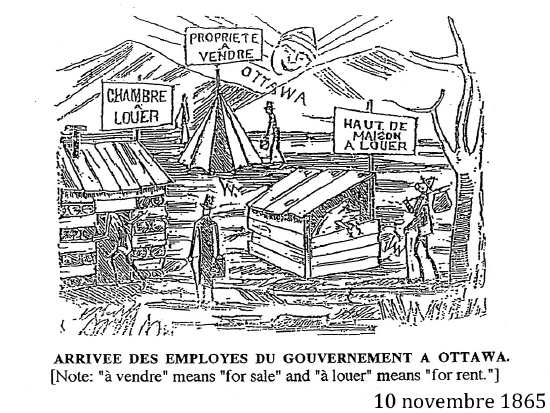
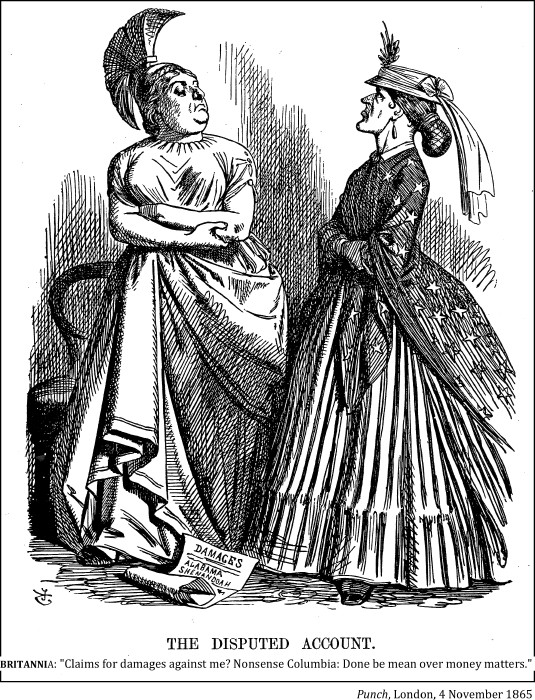
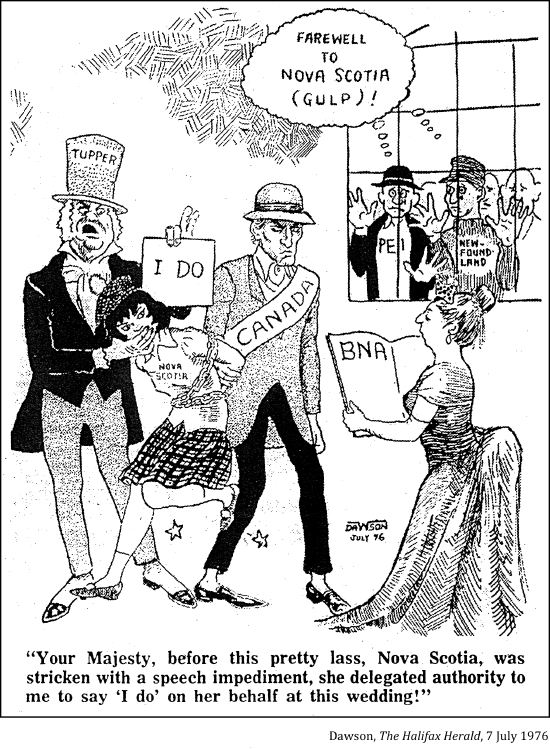
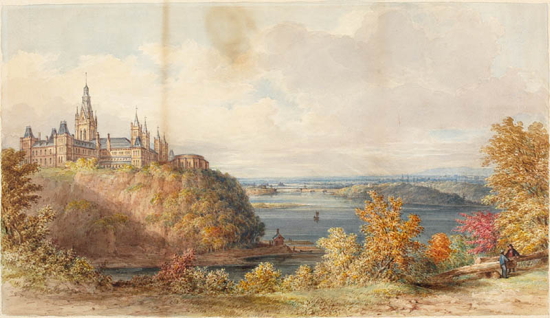
Parliament Buildings, Ottawa. Les édifices du Parlement, Ottawa. LAC R9266-183, Collection de Canadiana Peter Winkworth, James D. Duncan, ca. 1866
"But Canada is not compact. She has yet only 3,000,000 inhabitants . . . She has an exposed frontier of 1000 miles, with no natural defences for 800 miles above Quebec. Along the whole of this frontier line she is menaced or overlapped by the Great Republic, with 34,000,000 inhabitants and 1,000,000 trained soldiers who have been under fire. These troops, accustomed to obey officers of great ability, familiar with the art of war, could by means of twenty railroads, pointing to the Canadian frontier, be massed in a week, and thrown into the Province."
Joseph Howe, speech 1866
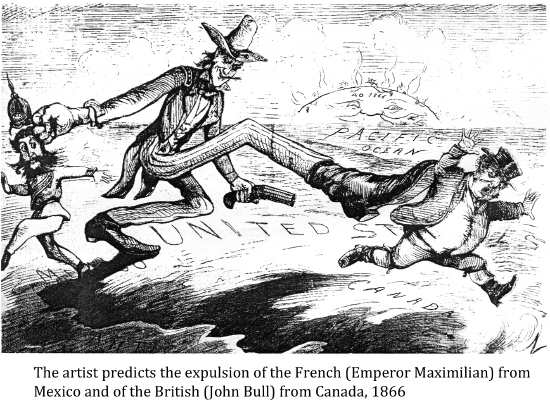
The fate awaiting us if God suffered us at some future date to enter the great American republic, would be exactly comparable to that of so many tributaries which have come to be swallowed up in the great St. Lawrence.
Bishop of Saint-Hyacinthe, letter to his congregation, 1866 [?]
"We are a Fenian brotherhood,
skilled in the arts of war,
And we're going to fight for Ireland,
the land that we adore;
Many battles have we won,
along with the boys in blue,
And we'll go to camp in Canada,
for we've nothing else to do."
Fenian Battle Song, 1866
"Tram, tramp, tramp our boys are marching,
Cheer up, let the Fenians come!
For beneath the Union Jack we'll drive
The rabble back,
And we'll fight for our beloved
Canadian home."
Canadian Militia Song, 1866
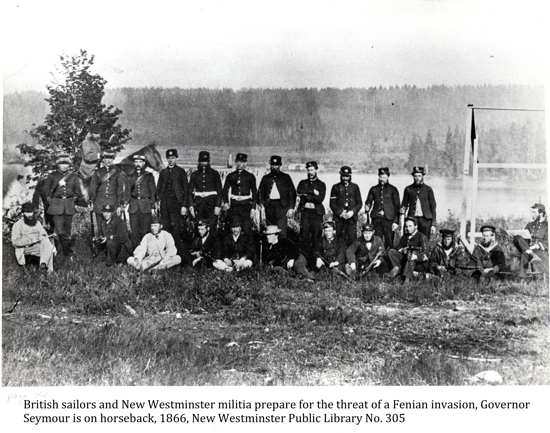
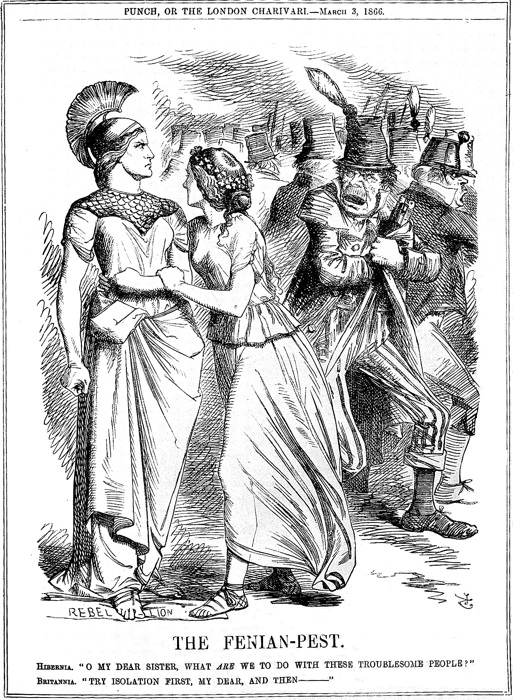
Punch, London, 3 March 1966
"The United States erected a tariff wall [in 1866] that Canada could not climb... The high tariff... gave impetus to Canada's nationhood. It compelled just what Confederation lacked–cohesiveness... without it Canadian resources would have gone to build up American cities, American ports and American railroads. Instead of having three transcontinental railroads running east and west, the Dominion would have had hundreds of roads running south, feeding the products of Canada's forests and farms and mines into American cities. The American tariff was a good thing for Canada."
Miss Agnes Laut, The Canadian Courier, 9 March 1907.
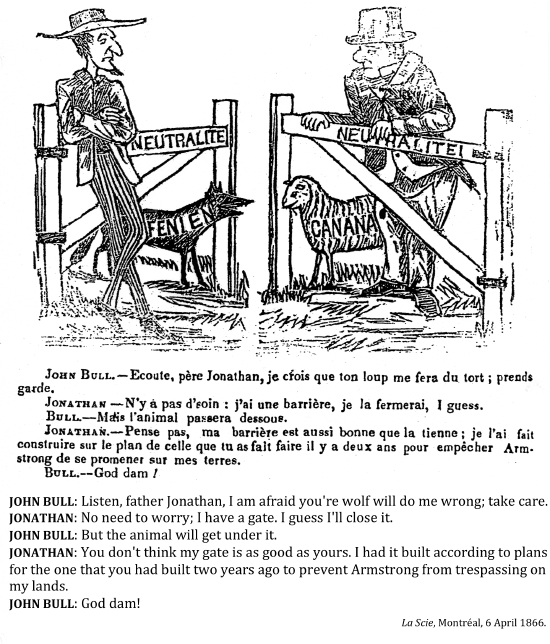
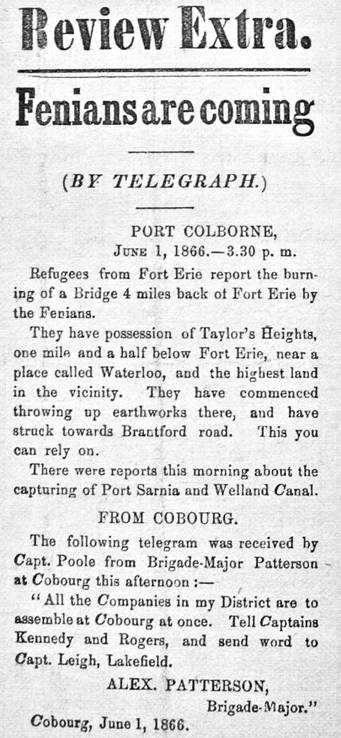
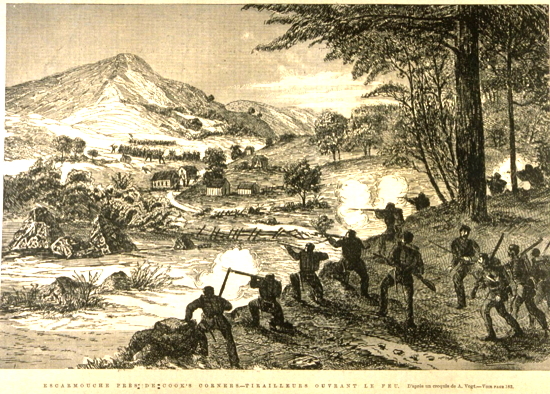
Fenian raid in Quebec - Escarmouche pre`s de Cook's Corner tirailleurs ouvrants le feu, June 1866, National Archives of Québec
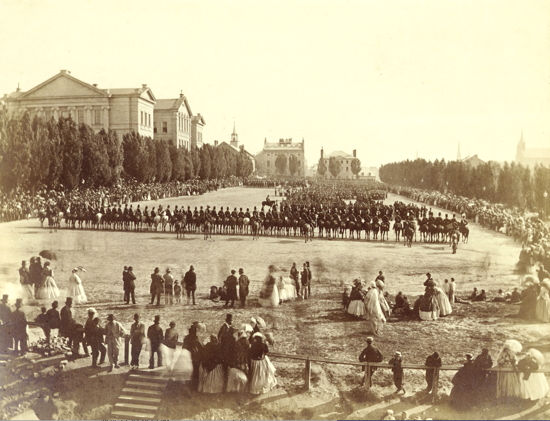
Reception of Canadian Volunteers on the Champ de Mars, Montreal. 1866, William Notman, TRL 928-2-39
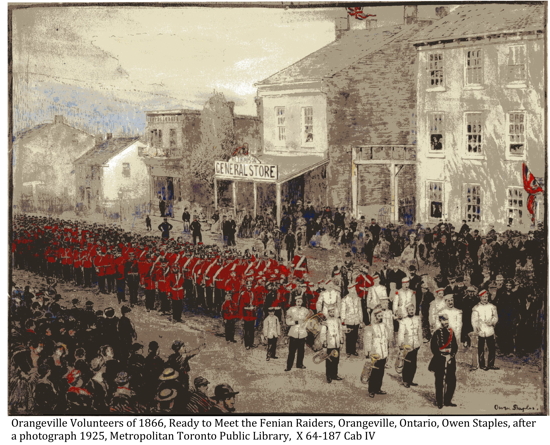
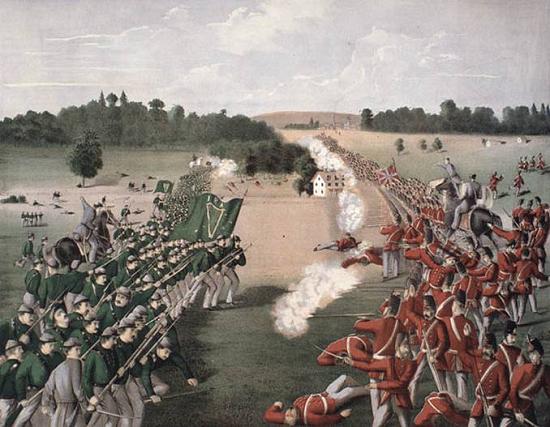
Battle of Ridgeway, C.W. Desperate Charge of the Fenians, under Col. O'Neill near Ridgeway Station, June 2, 1866, Library and Archives Canada, Acc. No. 1946-35-1
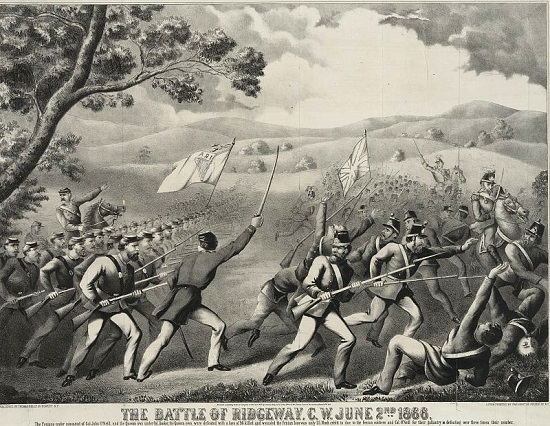
Thomas Kelly, The Battle of Ridgeway, 2 June 1866, Lithograph, New York, 16 May 1870.
["Print shows Fenian Brotherhood (Irish American) troops under the command of Colonel John O'Neill charging the retreating Queen's Own Rifles of Canada commanded by Colonel A. Booker at Ridgeway, Ontario, during the Fenian invasion of Canada. The Fenians under command of Col. John O'Neill, and the Queens own under Col. Booker, the Queens own were defeated with a loss of 96 killed and wounded[,] the Fenian loss was only 25. Much credit is due to the Fenian soldiers and Col. O'Neill for their gallantry in defeating over three times their number."]
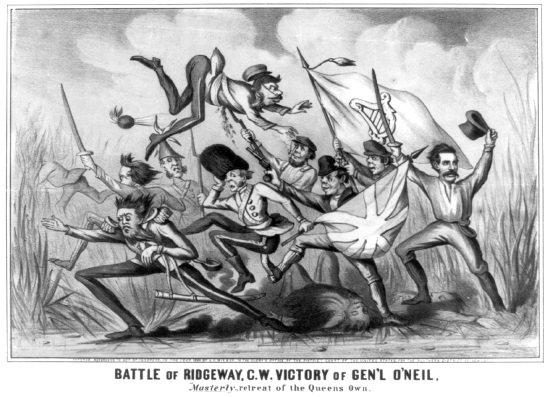
1866 Public domain, via Wikimedia Commons
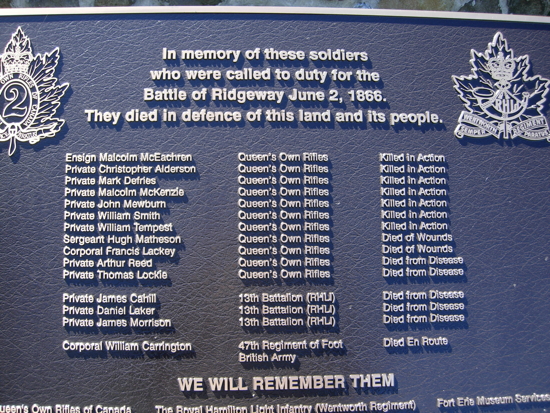
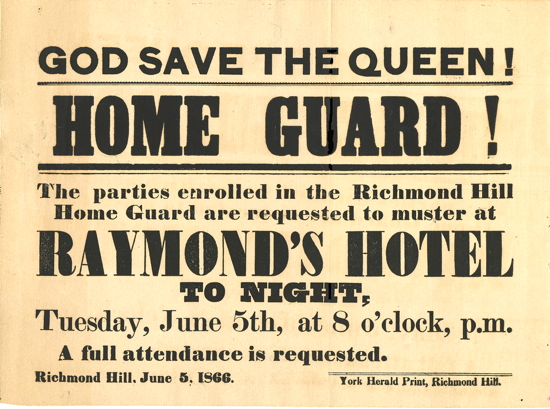
Home Guard!, Toronto Reference Library, 1866. Home Guard.sb, 5 June 1866
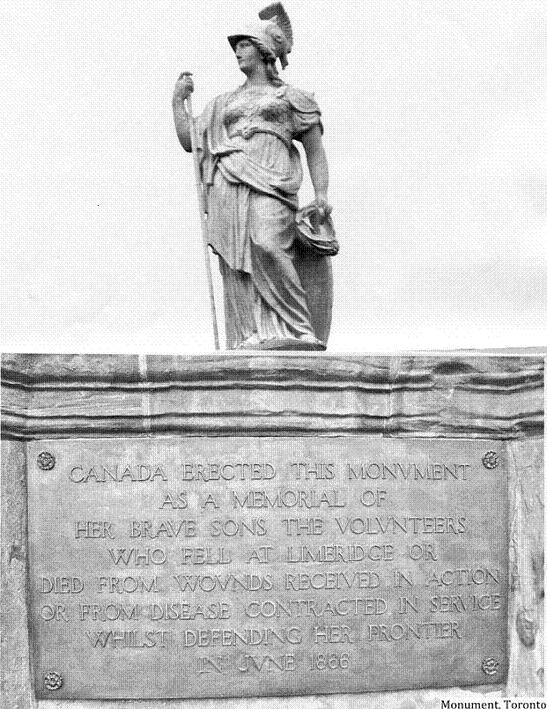
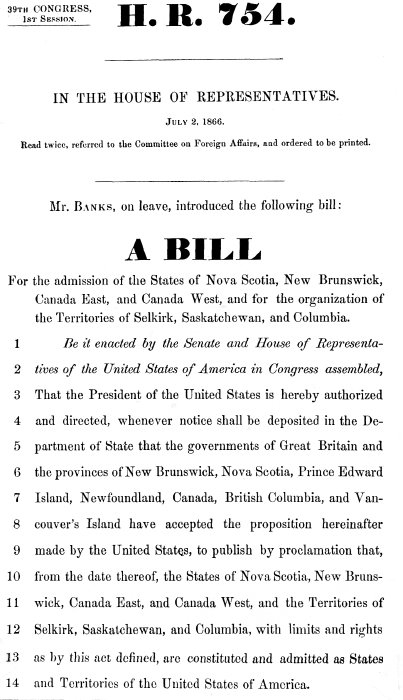
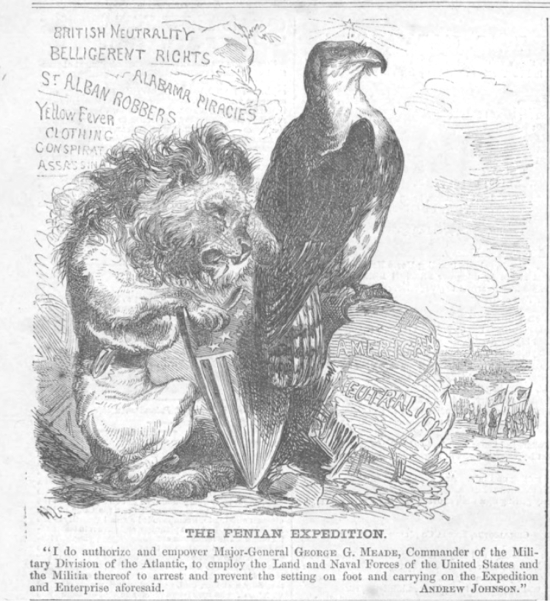
Harper's Weekly, New York, 23 June 1866
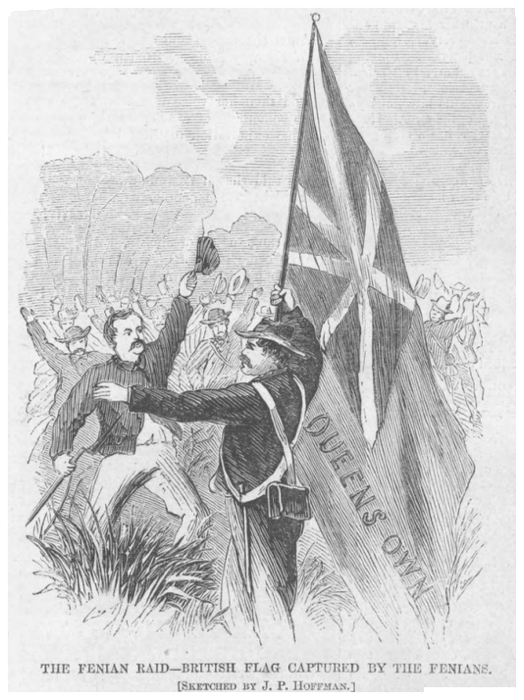
Harper's Weekly, New York, 23 June 1866
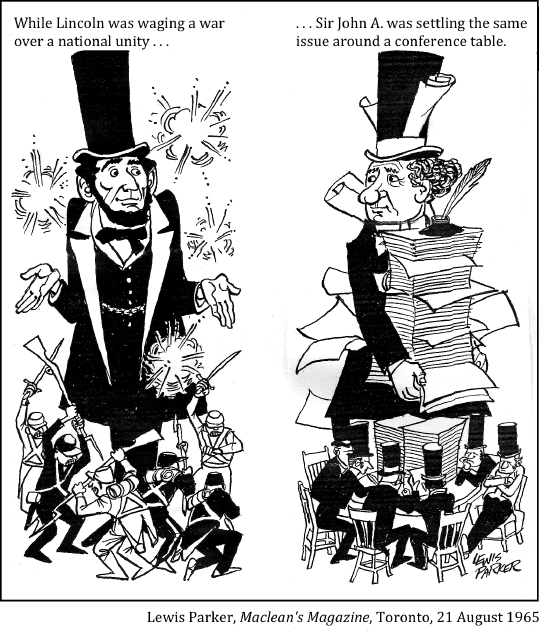
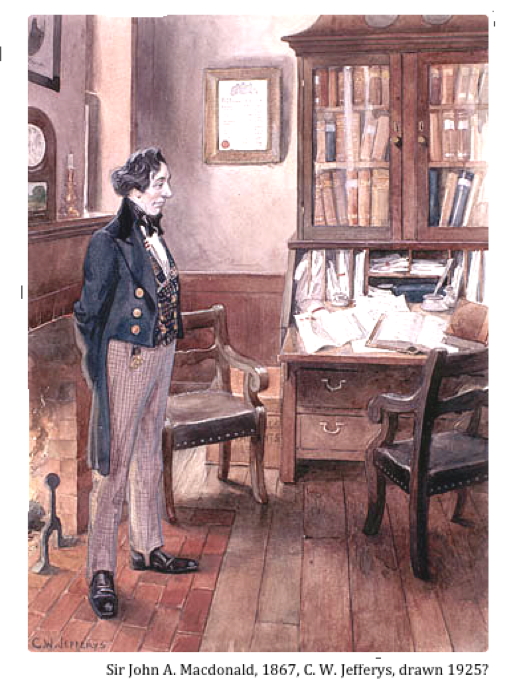
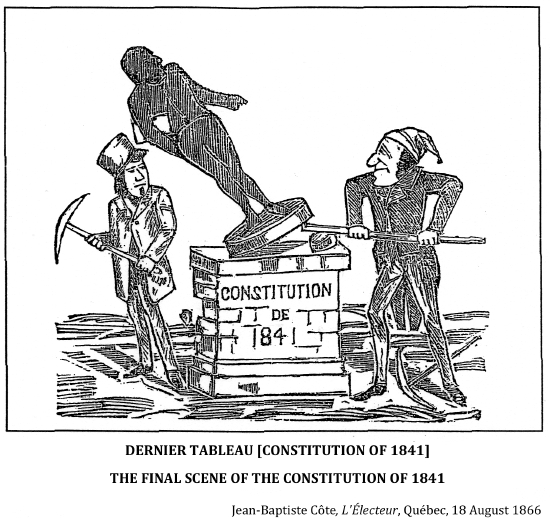
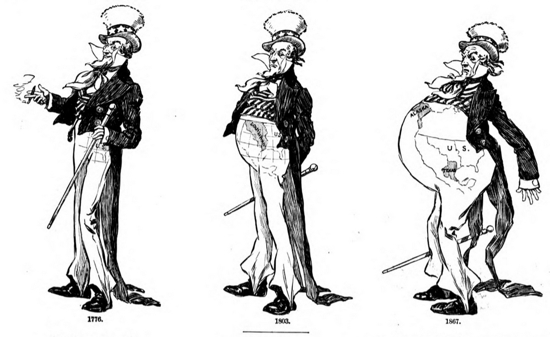
Life, New York, 28 May 1914
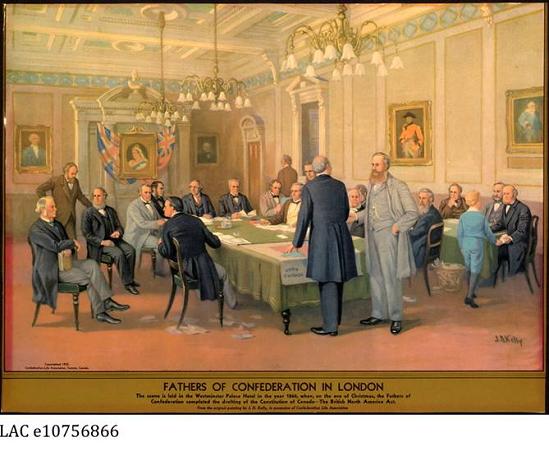
Fathers of Confederation in London. LAC Acc. No. R1300-360, J. D. Kelly, 1935
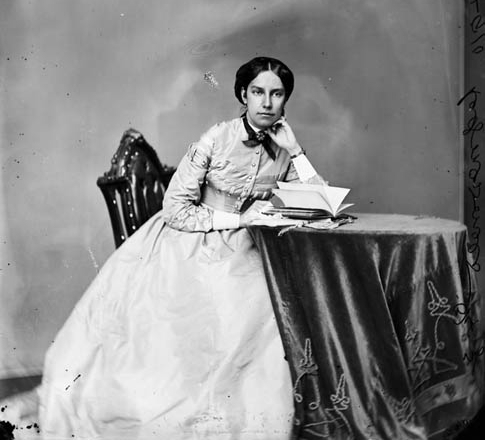
1866 Lady Susan Agnes Macdonald (née Bernard) married Sir John A. Macdonald on 16 February 1866. LAC, PA-026286 William James Topley May 1868
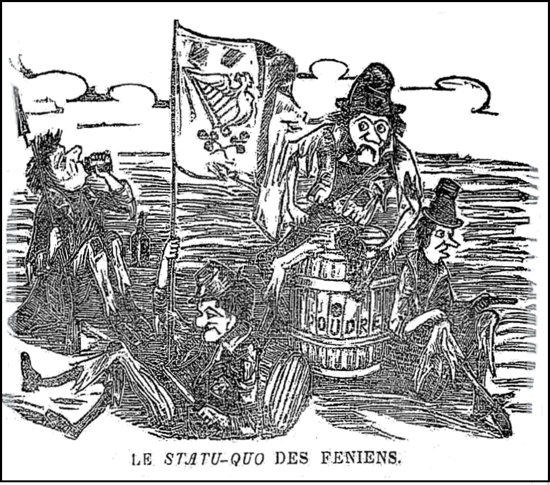
Le charivari canadien, Québec, 12 June 1868
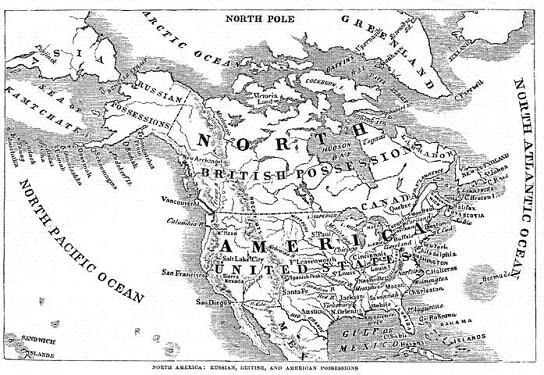
"Macdonald is a sharp fox. He is a very well informed man, ingratiating, clever and very popular. He is the man of the Conference [London]."
Hector-Louis Langevin, December 1866
"[Macdonald] had a clear idea of why he wanted power: to make certain Canada did not become American. He also had a clear idea of how this goal must be achieved: by stretching Canada into a continental nation that would be a mirror image of its rival."
Richard Gwyn, Nation Maker. Sir John A. Macdonald
He shall have dominion also from sea to sea.
Leonard Tilley, London, 1866
I am more than ever disappointed at the tone of feeling here [United Kingdom] as to the colonies. I cannot shut my eyes to the fact that they want to get rid of us. They have a servile fear of the United States and would rather give us up than defend us, or incur the risk of war with that country [USA].
Alexander Galt, letter to his wife, 1867
We look to Confederation as the means of relieving this country from much expense and much embarrassment.
Editorial, Times [London], 1867
It seems to me impossible that we should long hold British Columbia from its natural annexation.
C. B. Adderley, Jr. min. Secretary for the Colonies, comment, 1867
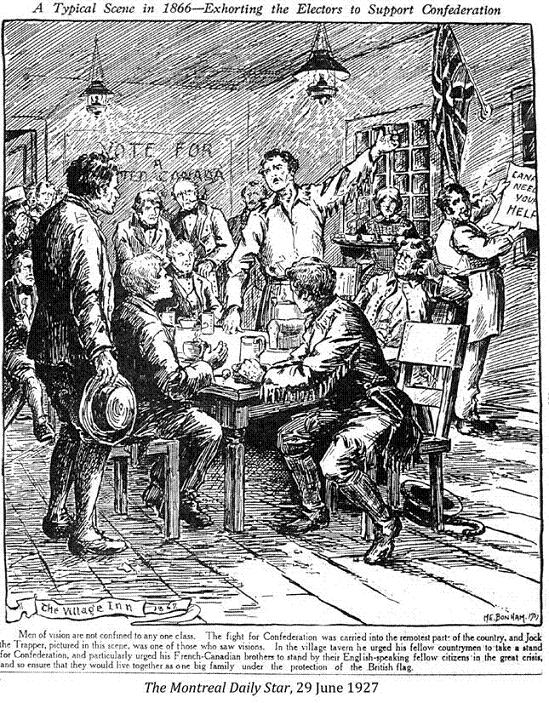
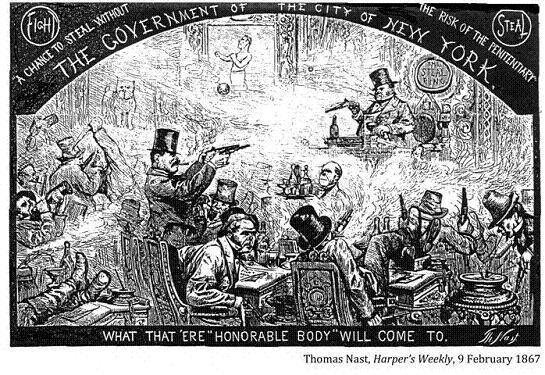
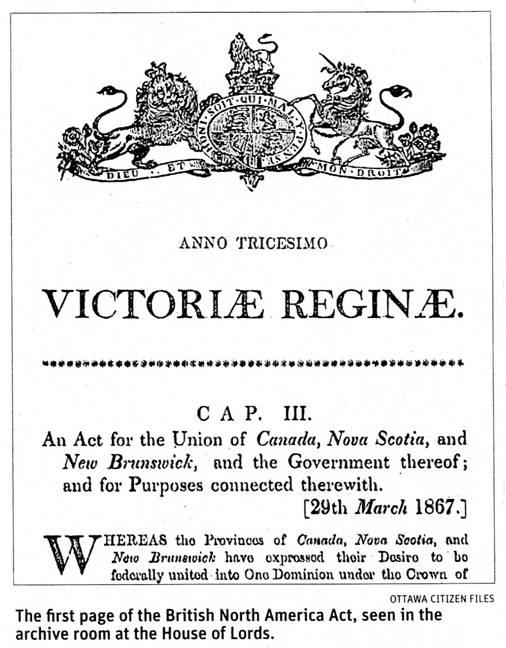
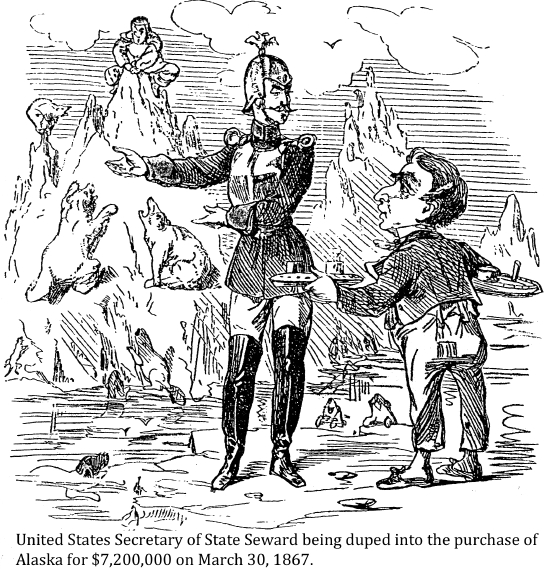
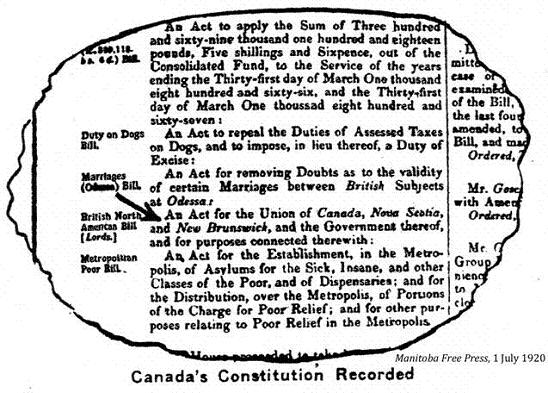
"The United States] rushed to get through their purchase of the Alaska panhandle just as the new country was being declared. . . Washington wanted to hem it [Canada] in and make it as weak as possible."
John Ralson Saul, A Fair Country
"It [the purchase of Alaska by the U.S. in 1867] is the answer from Washington to the Confederation of our North American provinces. It is more than an answer – it is a challenge."
Morning Post [England], 6 April 1867
[The Alaska purchase] is a visible step to the occupation of the whole North American continent.
Sen. Charles Sumner, chair of the Sen. Com. on Foreign Relations, 7 April 1867
"The purchase [of Alaska] places the whole of Her Majesty's possessions on the Pacific in the position of a piece of meat between two slices of bread, which they may be devoured by a single bite."
The British Colonist, 16 May 1867
"If the United States desires to outflank us in the west, we must . . . lay our hands on British Columbia and the Pacific Ocean. The country cannot be surrounded by the United States."
Alexander Galt, Montreal Gazette , 24 May 1867
[When the Americans purchased Alaska they] "boasted they had sandwiched British Columbia and could eat her up at any time!!!!"
W. K. Lamb
"Federation in 1867 became the instrument for westward expansion. It was the political expedient for bringing the West under the control of the St. Lawrence Valley."
R. G. Ridell
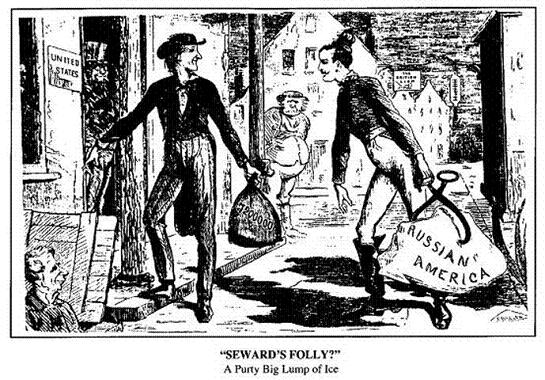
I know that Nature designs that this whole continent, not merely the thirty-six states, shall be, sooner or later, within the magic circle of the American union.
Secretary of State William Seward, speech in Boston, 1867
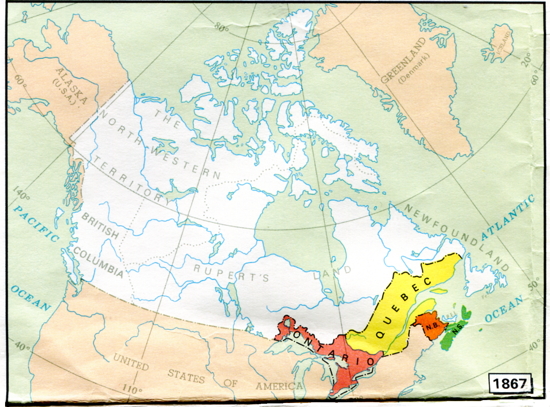
Surveys and Mapping Branch, Ottawa, 1969
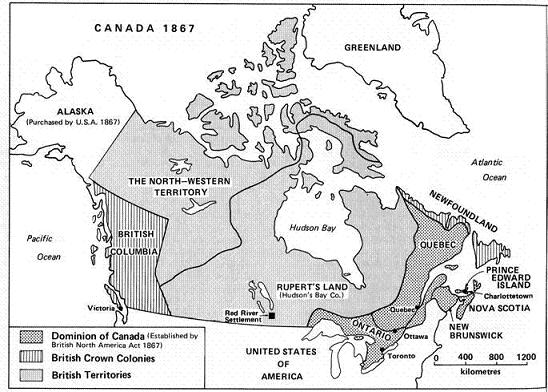
Through the young giant's mighty limbs, that stretch from sea to sea,
There runs a throb of conscious life-of waking energy.
From Nova Scotia's misty coast to far Columbia's shore,
She wakes-a band of scattered homes and colonies no more,
But a young nation, with her life full beating in her breast,
A noble future in her eyes-the Britain of the West.
"He shall have dominion also from sea to sea."
Psalm 72, verse 8 [Origin of the term Dominon of Canada suggested by Leonard Tilley]
"Peace, Order and good Government." [Equivalent of American "Life, Liberty and the pursuit of happiness."]
"When the experiment of the 'Dominion' shall have failed, as fail it must, a process of peaceful absorption will give Canada her proper place in the Great North American republic."
New York Times, July 1867
"As a distinct and separate nationality, we form a state within a state [Quebec]. We enjoy the full exercise of our rights, and formal recognition of national independence. . . In giving ourselves a complete government we affirm our existence as a separate nationality."
La Minerve, 1 July 1867
"British North America Act, 1867
91. It shall be lawful for the Queen, by and with the Advice and Consent of the Senate and House of Commons, to make Laws for the Peace, Order, and good Government of Canada, in relation to …
24. Indians, and Lands reserved for the Indians."
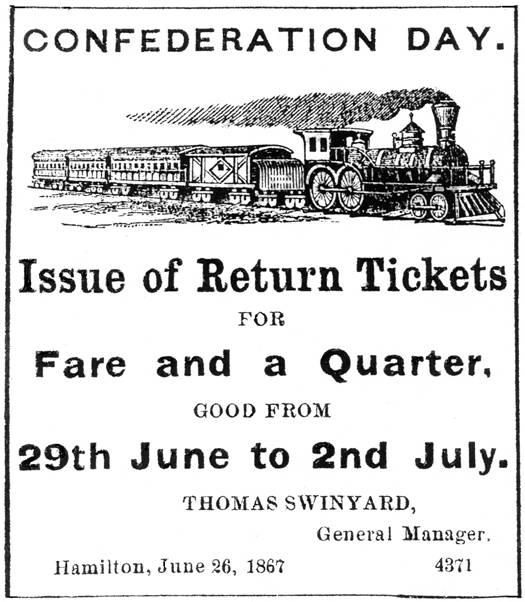
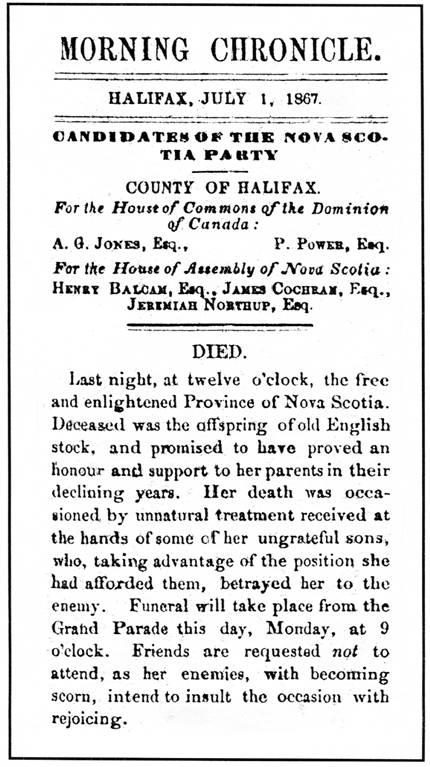
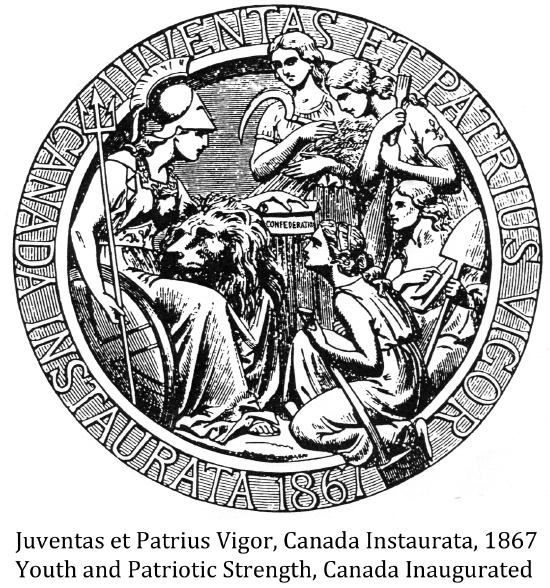
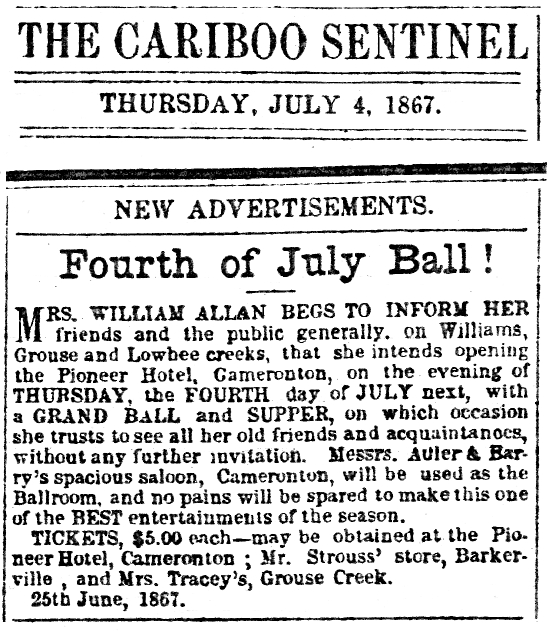
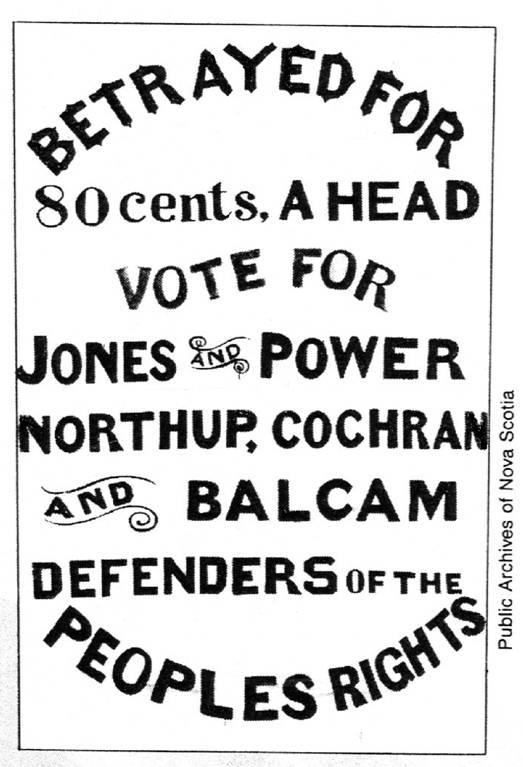
From Halifax to Sarnia, we are one people – one in laws, one in government, one in interests.
New Brunswick Reporter, 5 July 1867
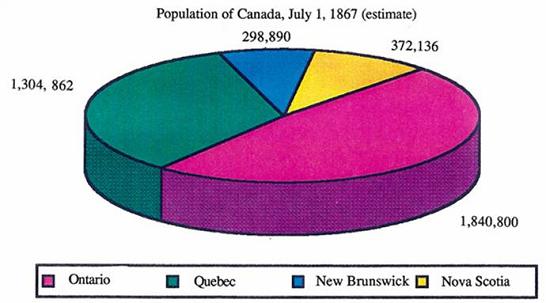
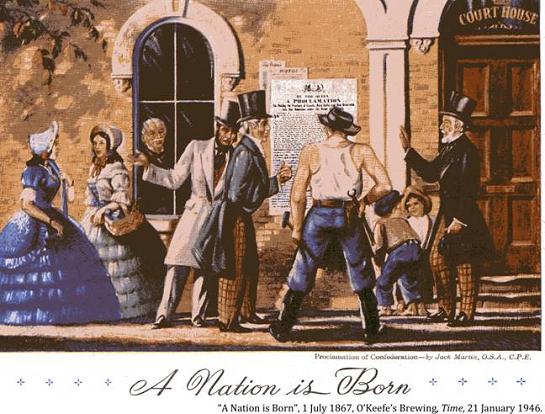
"When the experiment of the 'dominion' shall have failed, as fail it must, a process of peaceful absorption will give Canada her proper place in the Great North American Republic."
New York Times editorial, July 1867
"The purchase of Russian America . . . is a stage in the right direction. It looks to the Americanization of the American coast. It must be followed by our acquisition of British Columbia. It will drop of its own gravity into our lap as an apple from a tree."
W. W. Miller, Olympia, Washington, 2 September 1867
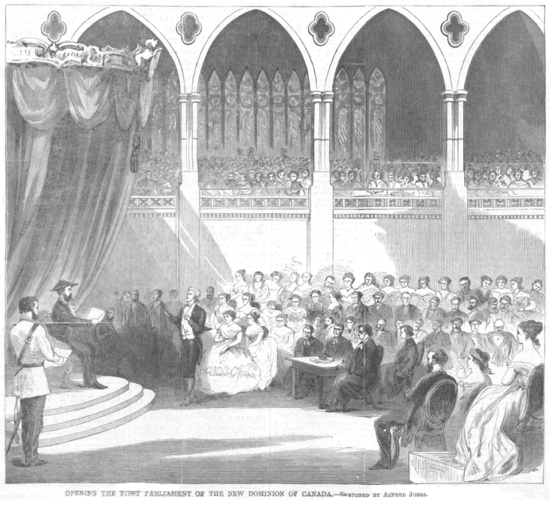
Harper's Weekly, New York, 30 November 1867
"The creation of Canada . . . was above all an act of imperialism. A nation-state annexed land inhabited by many other nations and then made them second-class citizens."
Will Ferguson, Why I Hate Canadians
Visit the following webpage to see maps showing the location of First Nations people.
Northwest Coast People
Plateau People
Plains People
Eastern Woodland Hunters
Farmers
Subartic People
Inuit
http://firstpeoplesofcanada.com/index.html
"Confederation . . . represented a deliberate attempt to remove Indigenous peoples from western lands and impose a new order based on agriculture and rooted in Anglo-Canadian civilization."
Bill Waiser, 2019
"I believe that if anything under the heavens be fated, it is that the American flag shall wave over every foot of this American Continent in course of time."
Senator Alexander Ramsay, 1868
"I see in the not remote distance one great nationality, bound, like the shield of Achilles, by the blue rim of Ocean. I see it quartered into many communities, each disposing of its internal affairs, but all bound together by free institutions, free intercourse and free commerce. I see within the sound of that Shield the peaks of the Western Mountains and the crests of the Eastern waves, the winding Assiniboine, the five-fold lakes, the St. Lawrence, the Ottawa, the Saguenay, the St. John and the basin of Minas. By all these flowing waters in all the valleys they fertilize, in all the cities they visit in their course, I see a generation of industries, contented, moral men, free in name and in fact – men capable of maintaining, in peace and in war, a constitution worthy of such a country!"
Thomas D'Arcy McGee, 1868
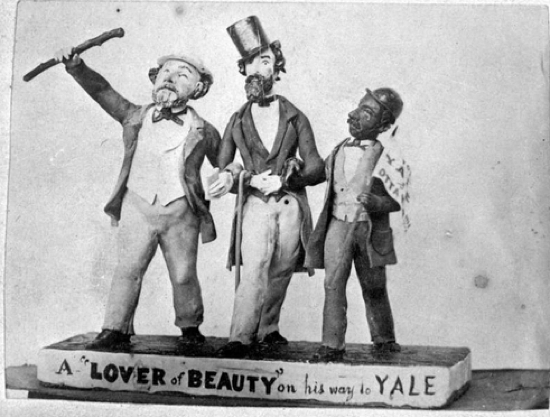
"A Lover of Beauty on his way to Yale:"; a cartoon in sugar of John Gustavus Norris, Amor De Cosmos and Mifflin Wistar Gibbs; delegation to the Confederation League convention in Yale; created by Victoria confectioner Andrew W. Piper. BC Archives, A-01225, 1868
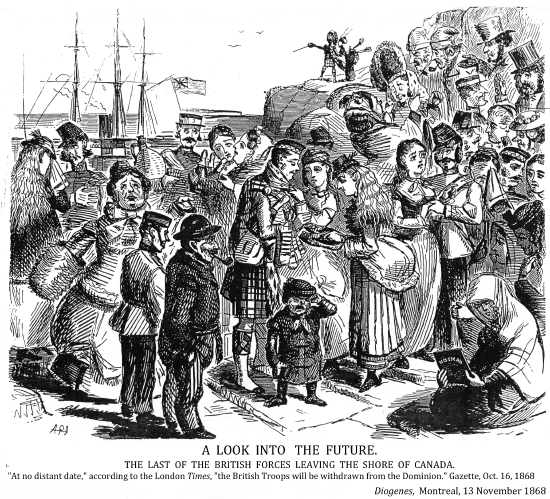
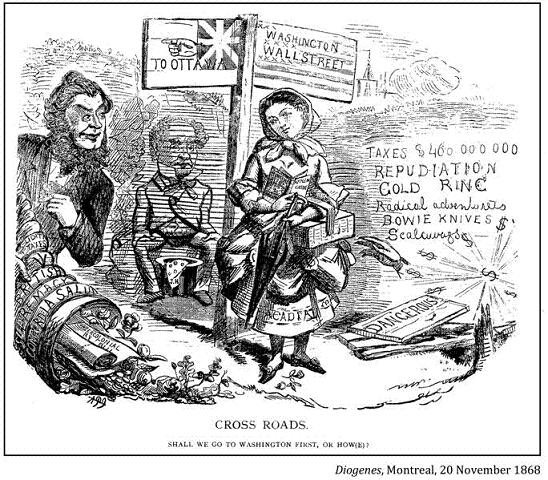

Lady S. Agnes Macdonald and daughter Mary. William James Topley, LAC PA-033465, June 1869
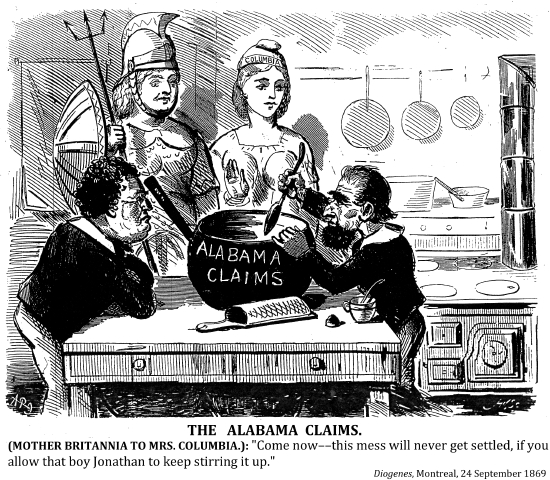
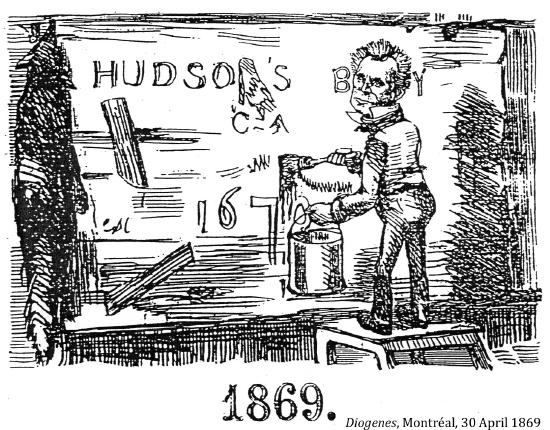
Sir George E Cartier was sent to England to negotiate for the transfer of the North-West Territory to the Dominion and the surrender of the rights of the Hudson Bay Company. The successful result of the mission was now announced to Parliament. The conditions agreed upon involved a payment by the Dominion Government of £300,000
"The cession of the Hudson Bay Territory was to Canada what the Louisiana Purchase was to the United States."
Walter N. Sage
"The opening by us first of a North Pacific Railroad seals the destiny of the British possessions west of the 91st meridian. They will become so strongly Americanized in interests and feelings that they will in effect be severed from the new Dominion and the question of their annexation will be but a question of time."
Committee on Pacific Railroads, U.S. Congress, February 1869
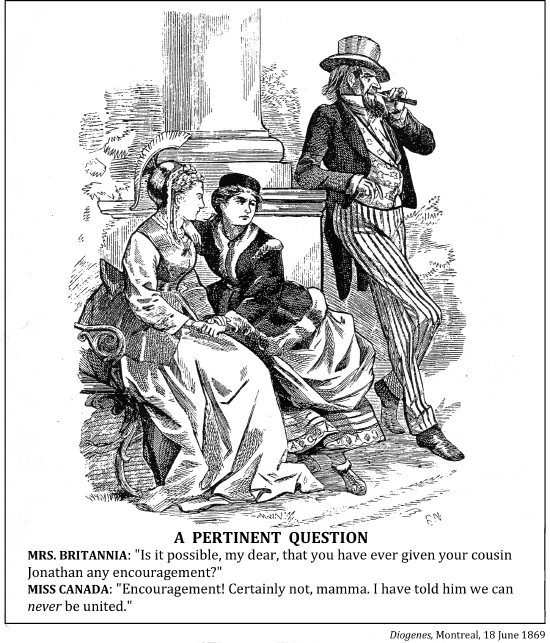
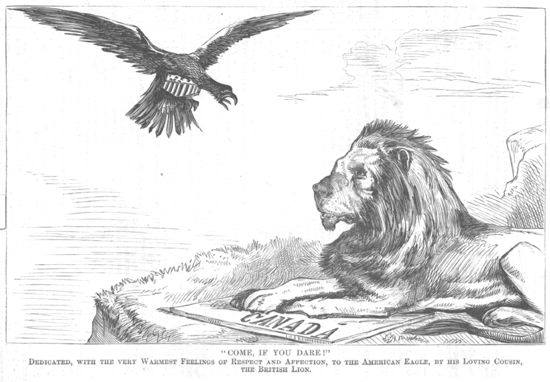
[Alabama claims] Harper's Weekly, New York, 19 June 1869
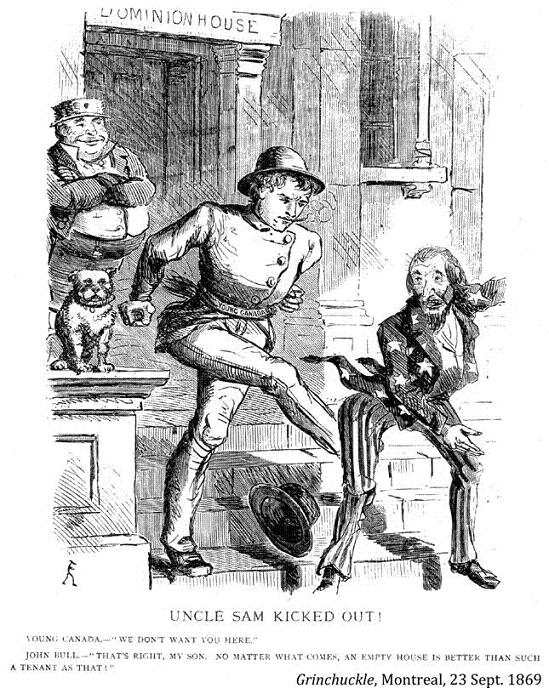
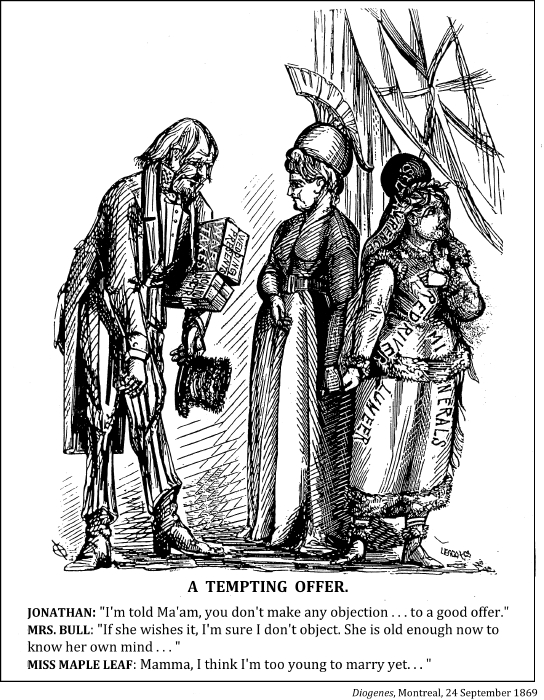
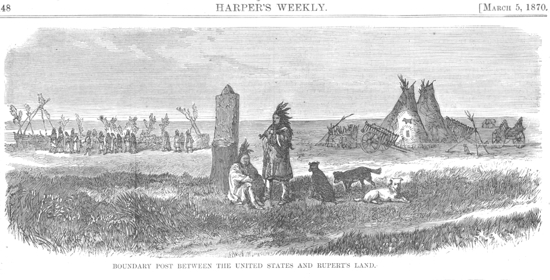
Harper's Weekly, New York, 5 March 1870
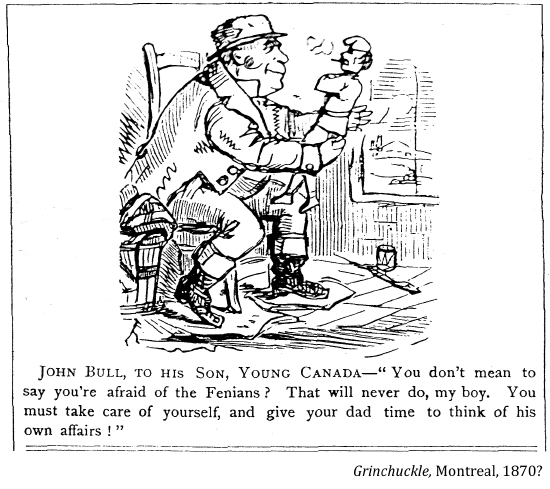
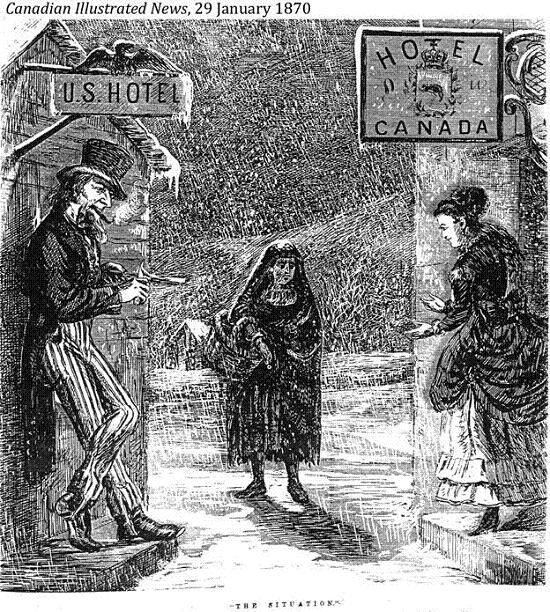
"[When Canada negotiated with the Hudson's Bay Company directorship in London to acquire Rupert's Land] no representative from Rupert's Land, including Indian and Metis peoples were invited to participate, let alone even consulted."
Bill Waiser, 2019
"Métis leaders were exiled and nine men who had participated in good faith in the negotiations of Manitoba into Confederation were murdered by the troops. . . Manitoba did not just “enter” Canada, it was burned, assaulted and beaten into Confederation. The parts of the Manitoba Act, 1870 that specifically protected Métis lands, the French language and the Catholic schools were dismissed by the new regime in Manitoba. It took the better part of 150 years and three trips to the Supreme Court of Canada to force Manitoba to honour those constitutional commitments."
Jean Teillet, Louis Riel and Canada: A New Relationship, 150 Years in the Making.
"Of all the conditions usually attached to a union of this colony with Canada, that of early establishment of railroad communications from sea to sea is the most important. If the railroad scheme is utopian, so is Confederation. The two must stand or fall together."
British Columbian , New Westminster, 2 February 1870
"In the spring of 1870, began the most important debate in British Columbia history [whether or not to join Canada]. . . probably the most important debate ever to take place in what is today Canada."
Derek Pethick
"We are sandwiched between the United States territory to the north and south . . Our only option is remaining a petty, isolated community . . . or . . . becoming the prosperous western outlet on the North Pacific of a young and vigorous people, the eastern boundary of whose possessions is washed by the Atlantic."
Henry Crease, 9 March 1870
The bond of union between Canada and the other provinces bears no resemblance to the union between England and her colonial possessions. There is no natural love and feeling of loyalty. The feeling of loyalty towards England is a blind feeling, instinctive, strong, born with us and impossible to shake off.
T.L. Wood, Confederation Debate, Victoria, 1870.
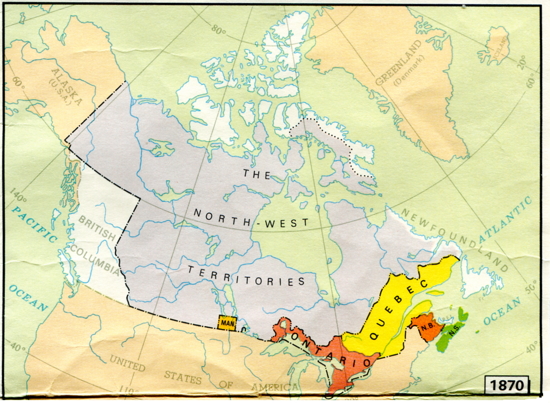
Surveys and Mapping Branch, Ottawa, 1969
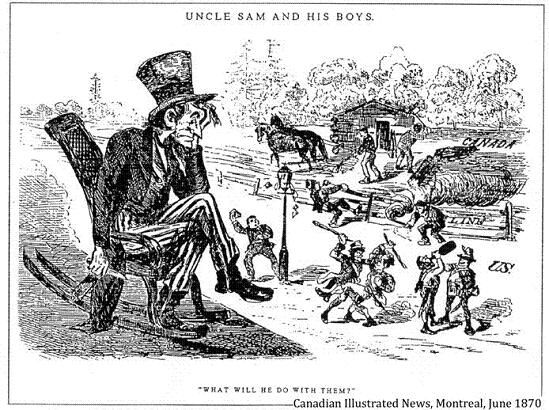
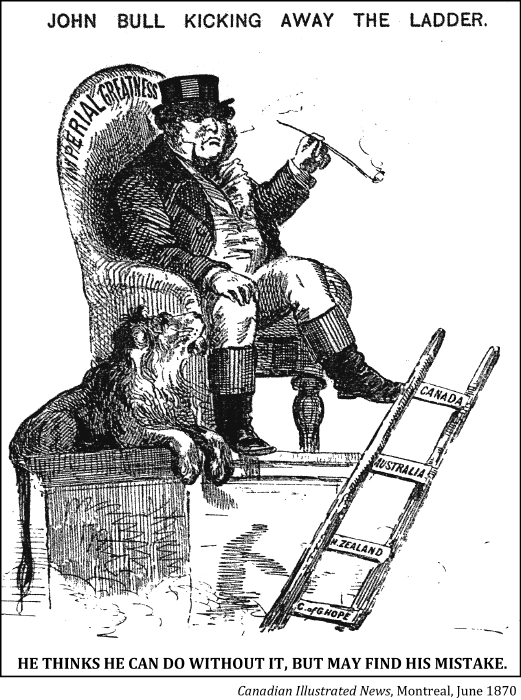
[Until 1875 many British believed that an empire imposed far greater costs than benefits. "Big Englanders" wanted an empire. "Little Englanders" didn't.]
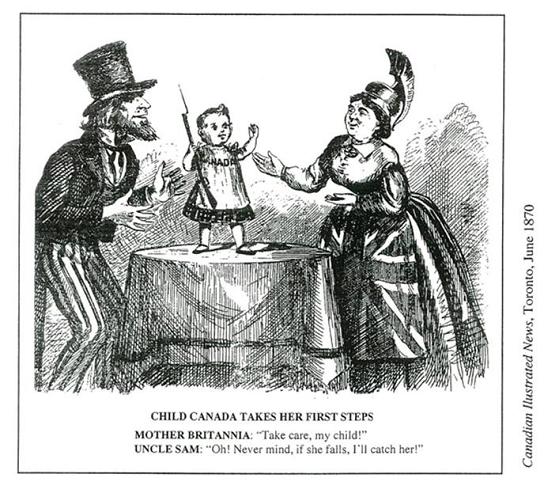
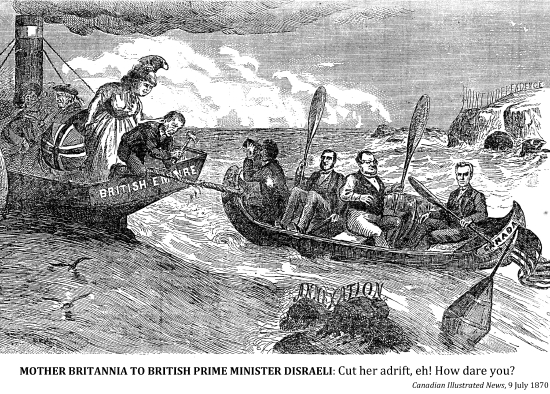
"The plain facts are that "the skids were greased" for coast-to-coast Confederation by the British Colonial Office and the Canadian government. British Columbia had little to say in the matter. By 1871 it was a bankrupt concern with a diminishing population; when the unexpectedly generous terms of Confederation were revealed, the pop-eyed colonists grabbed them with yelps of delight."
Alan Morley, 1967
"I hope that this new colony [British Columbia] in the Pacific may be but one step in the career of steady progress by which my dominions in North America may be ultimately peopled in an unbroken chain, from the Atlantic to the Pacific, a loyal and industrious population of subjects of the British Crown."
Queen Victoria, speech from the throne, 1871
"I found the Island in a high state of jubilation and quite under the impression that it is the Dominion that has been annexed to Prince Edward Island."
Lord Dufferin, letter, 1873
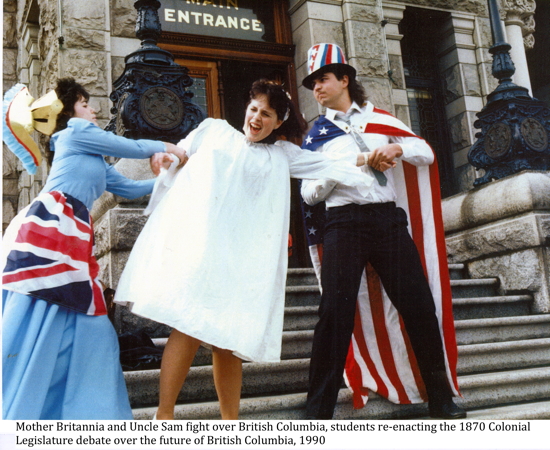
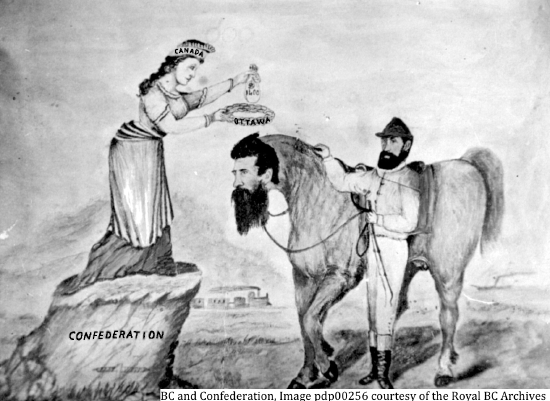
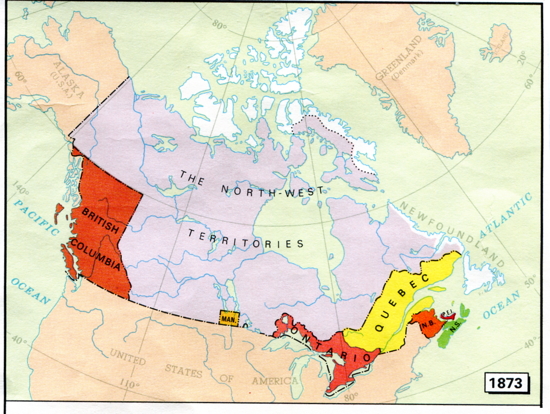
Surveys and Mapping Branch, Ottawa, 1969
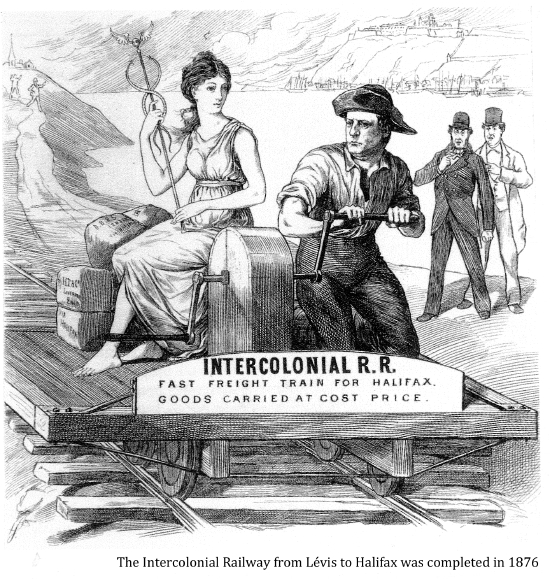
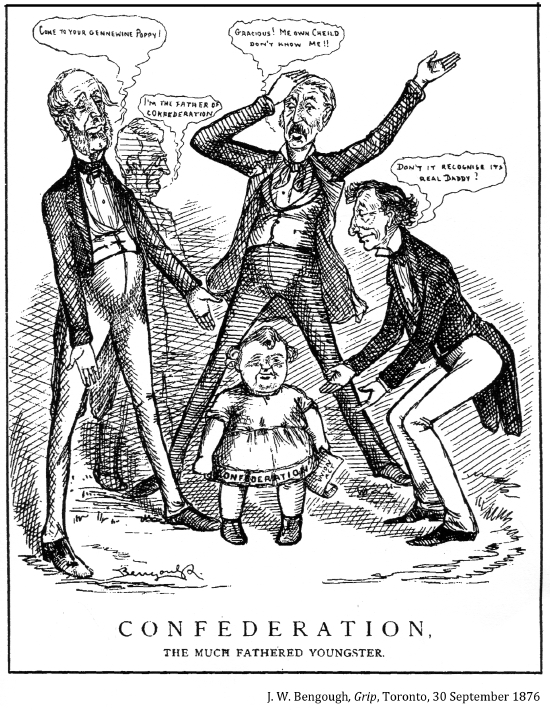
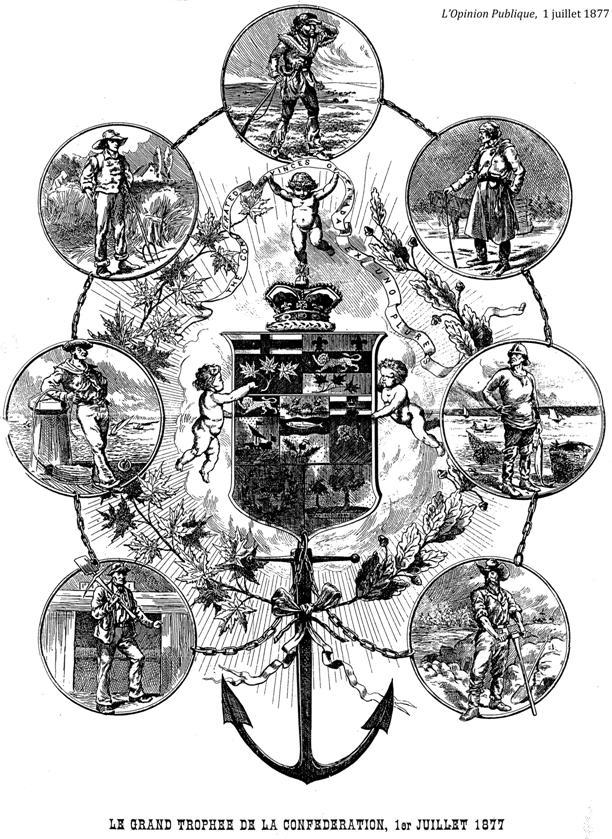
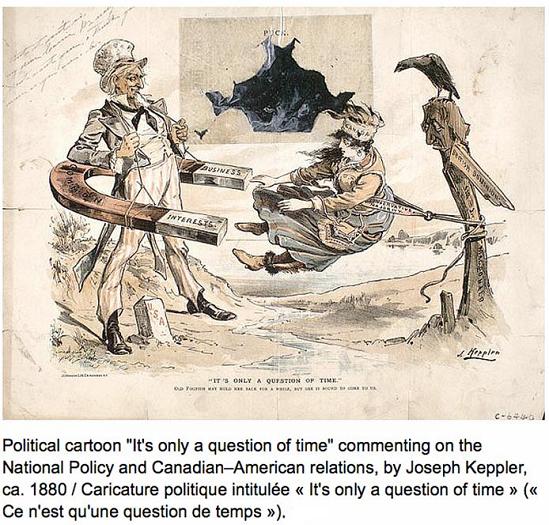
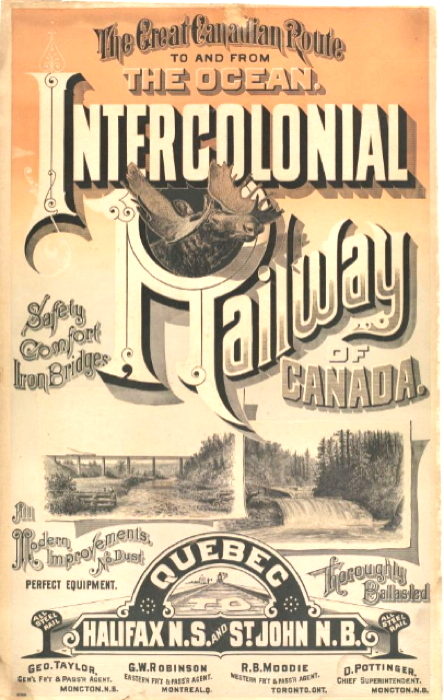
The great Canadian route to and from the ocean, Intercolonial Railway of Canada safety, comfort, iron bridges, New York, 188-, National Archives of Québec
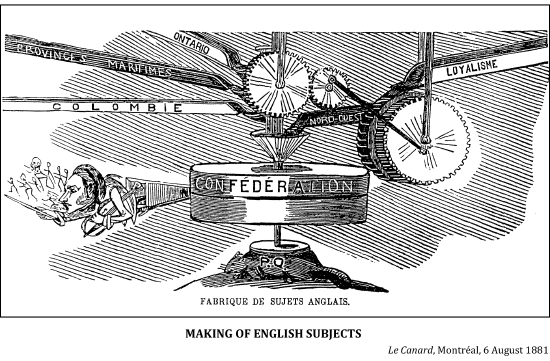
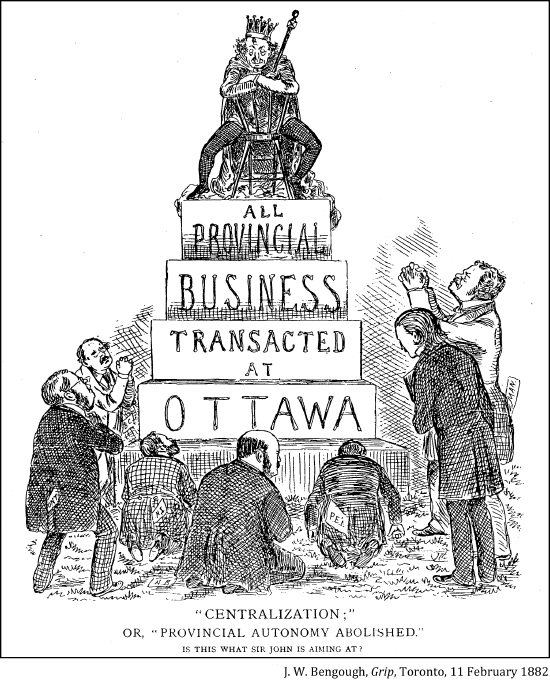
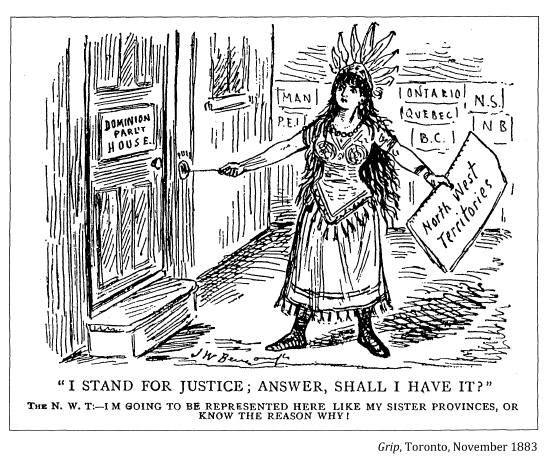
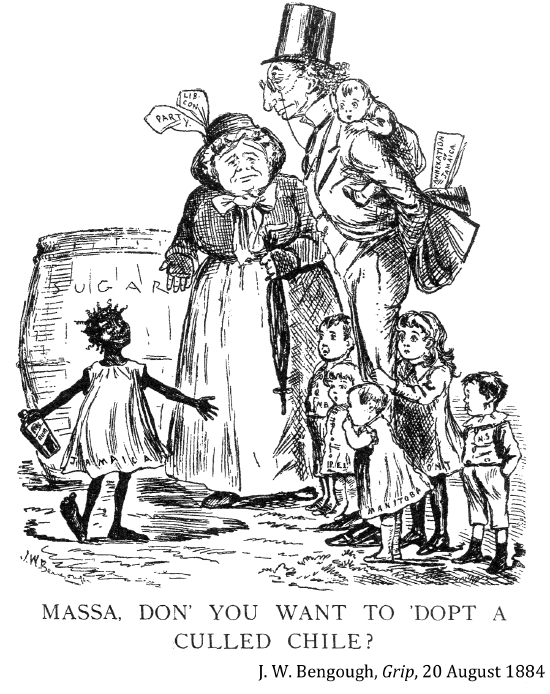
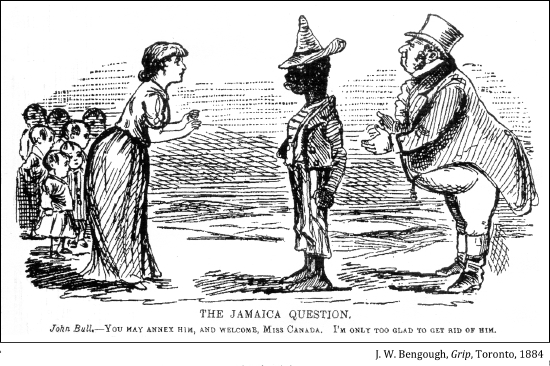
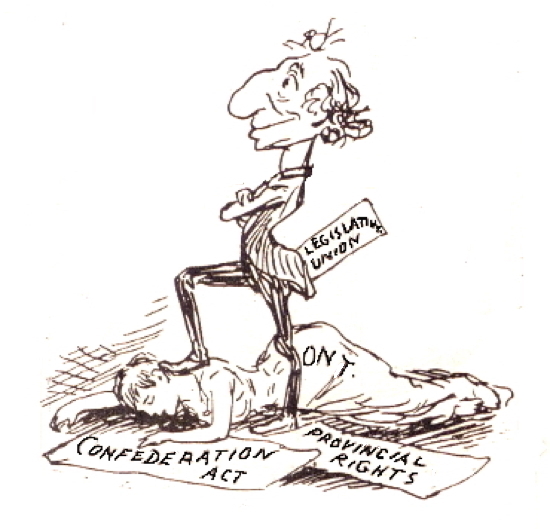
J. W. Bengough, The Voter's Alphabet, Toronto, 1886
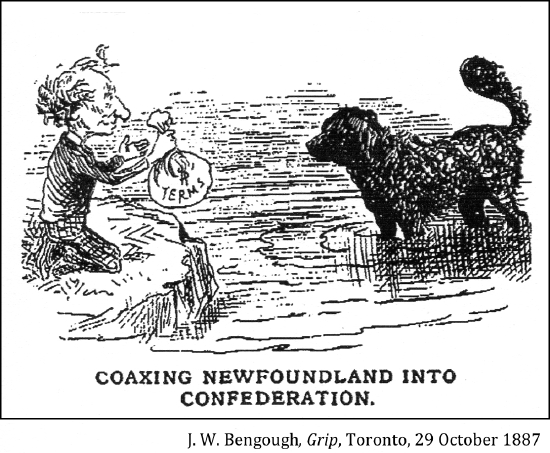
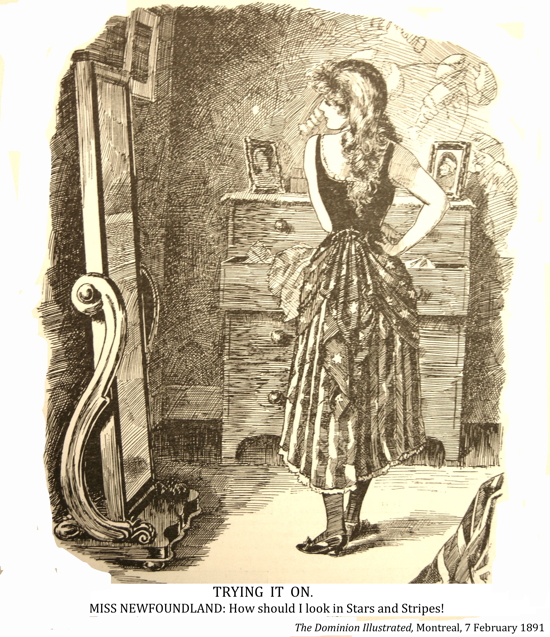
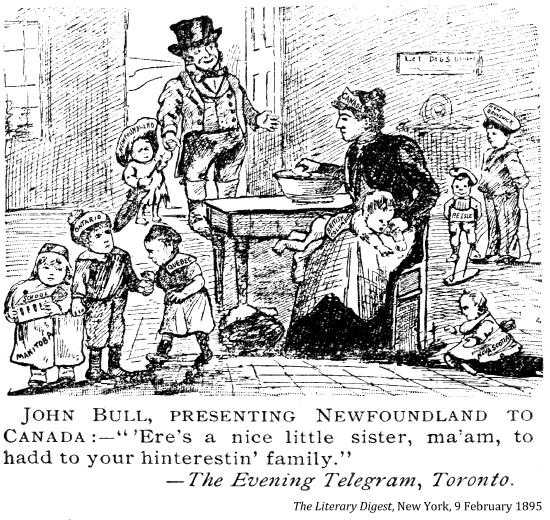
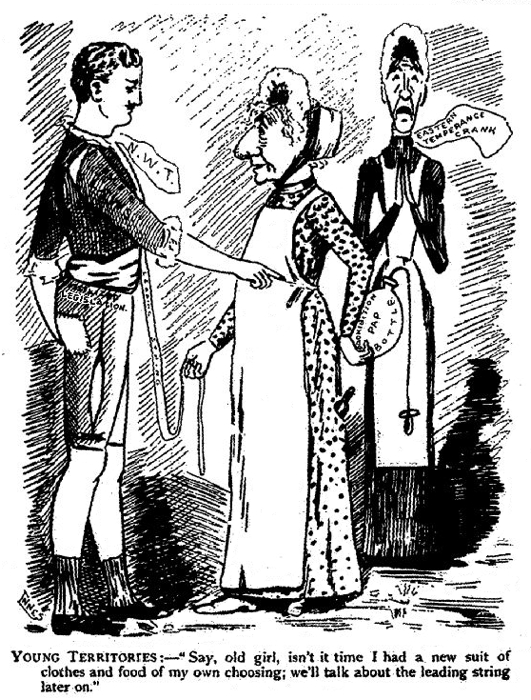
Young Territories, The Prairie Illustrated, Calgary, 20 December 1896, John Innes
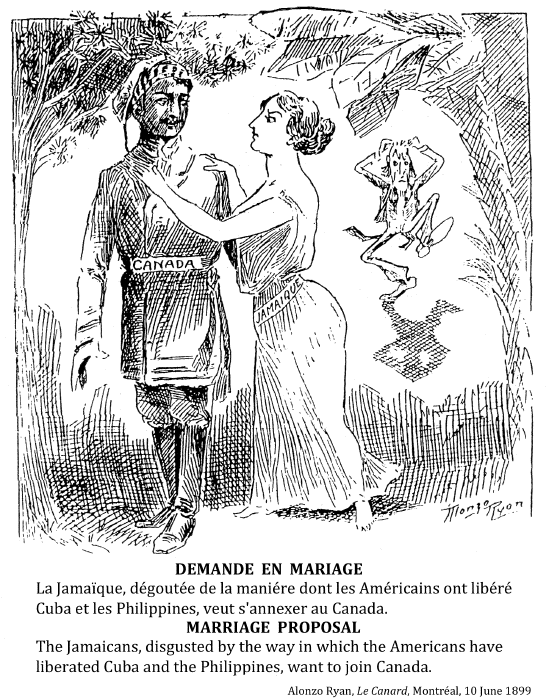
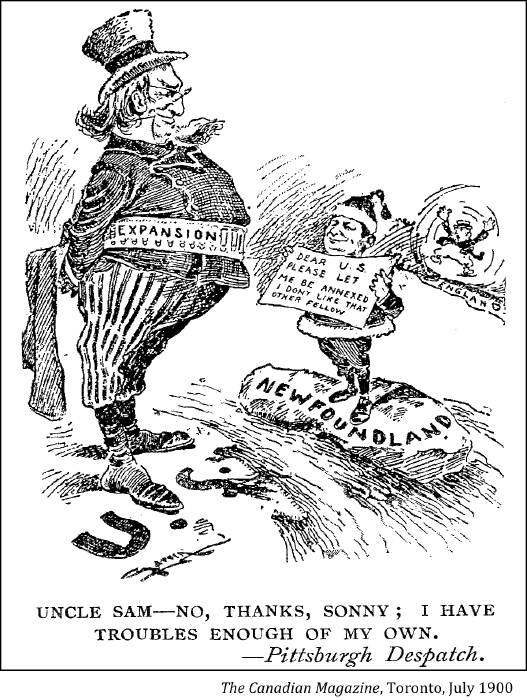
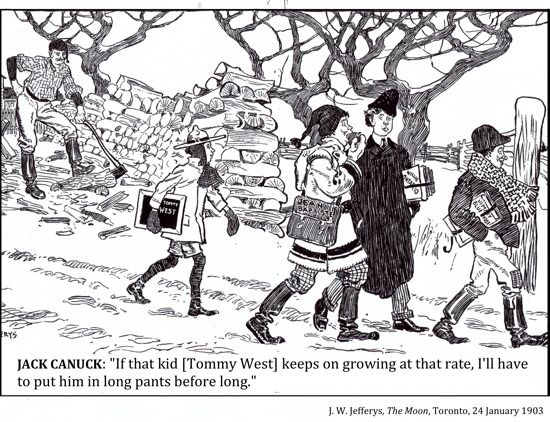
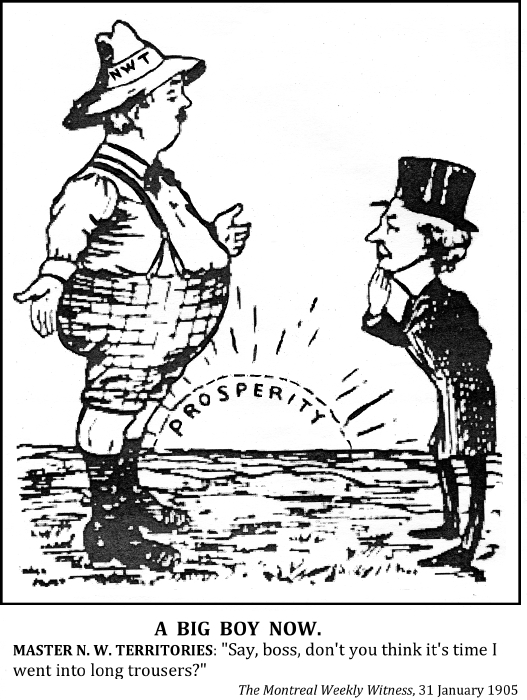
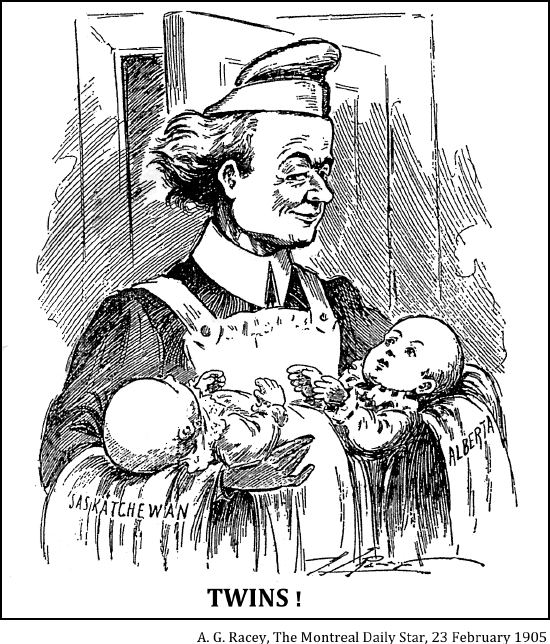
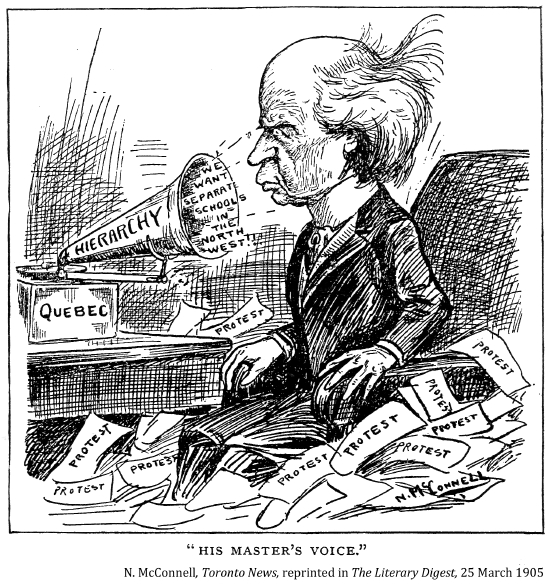
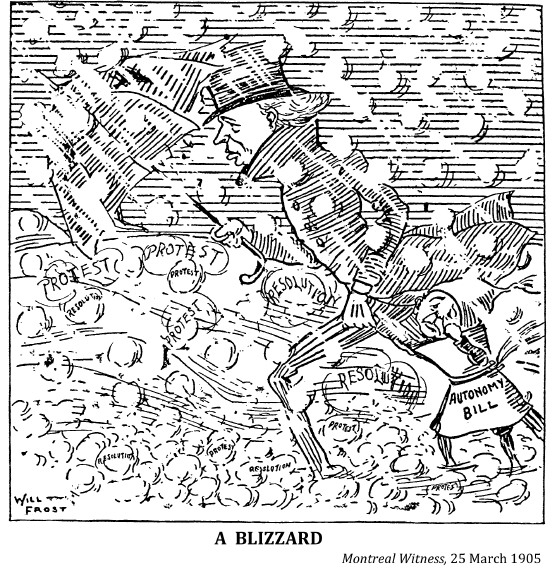
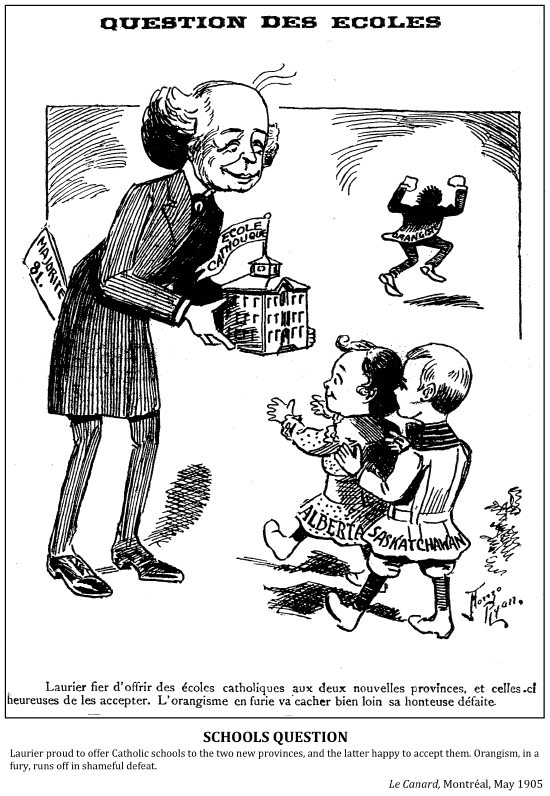
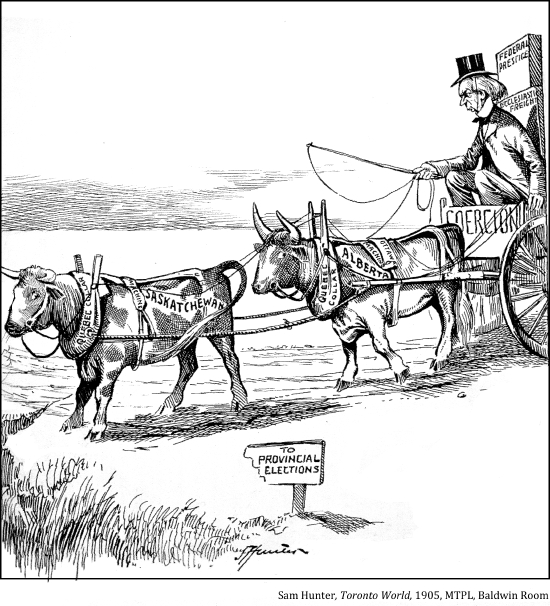
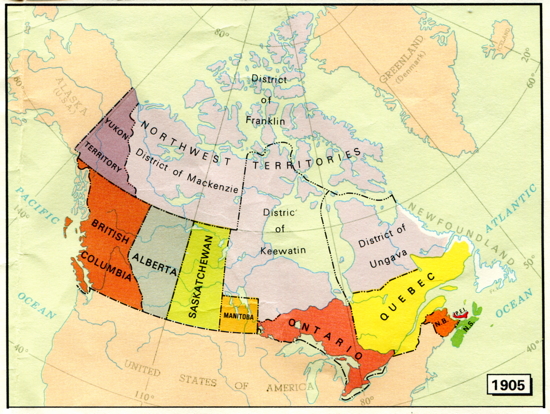
Surveys and Mapping Branch, Ottawa, 1969
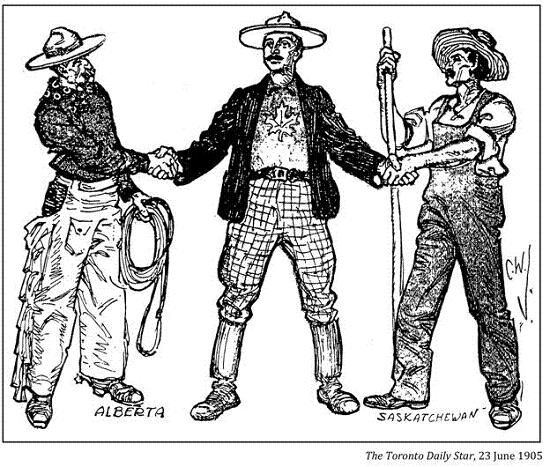
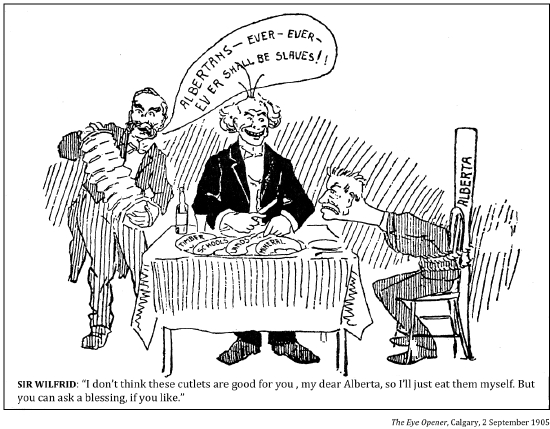
"The United States erected a tariff wall [in 1866] that Canada could not climb... The high tariff... gave impetus to Canada's nationhood. It compelled just what Confederation lacked–cohesiveness... without it Canadian resources would have gone to build up American cities, American ports and American railroads. Instead of having three transcontinental railroads running east and west, the Dominion would have had hundreds of roads running south, feeding the products of Canada's forests and farms and mines into American cities. The American tariff was a good thing for Canada."
Miss Agnes Laut, The Canadian Courier, 9 March 1907.
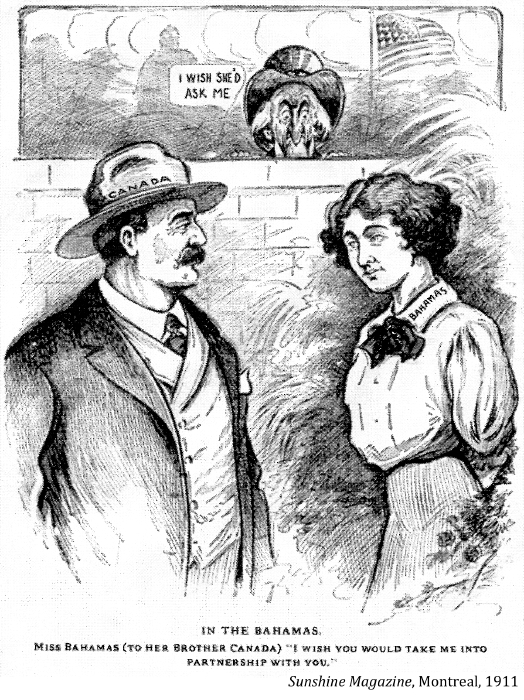
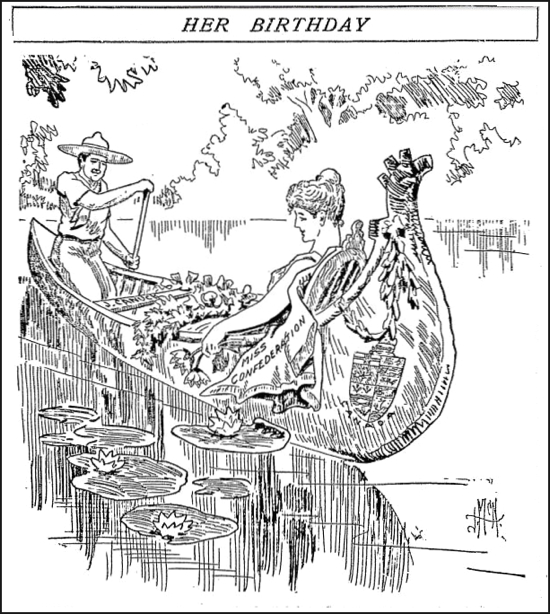
John McNaughton, The Morning Leader, Regina, 1 July 1914
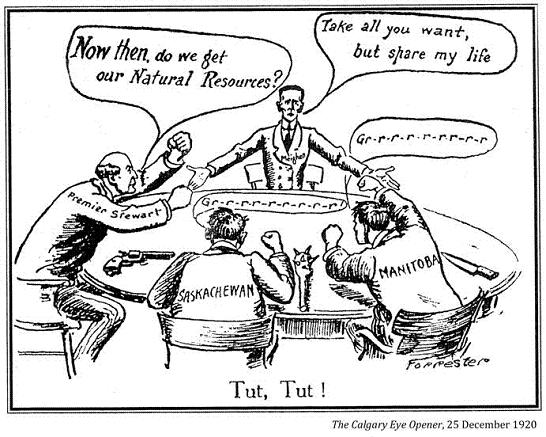
"Thanks to Confederation, thanks to our union with the sister provinces, our province has progressed in a marvelous manner, and it cannot be denied that it is Confederation that has made Montreal the fourth city of North America in importance."
Sir Lomer Gouin
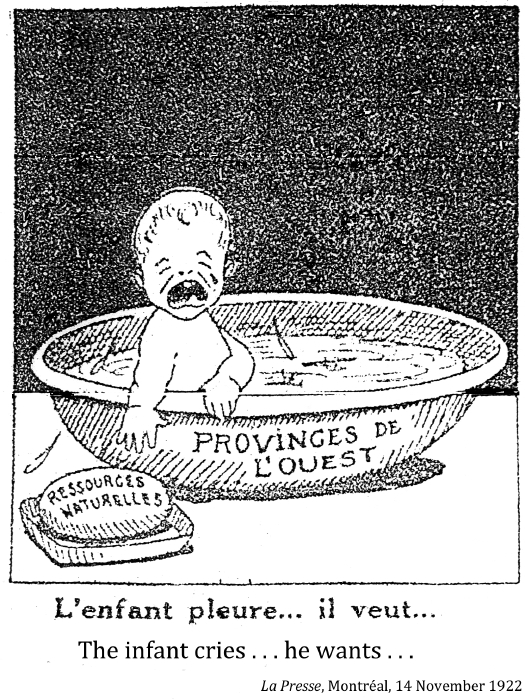
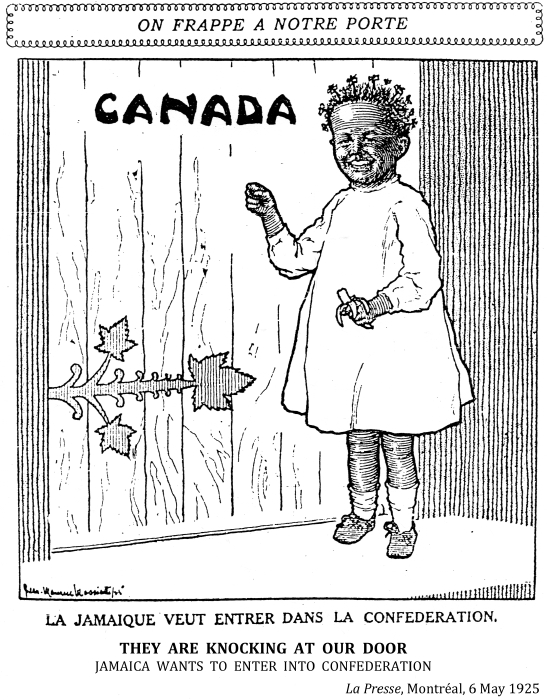
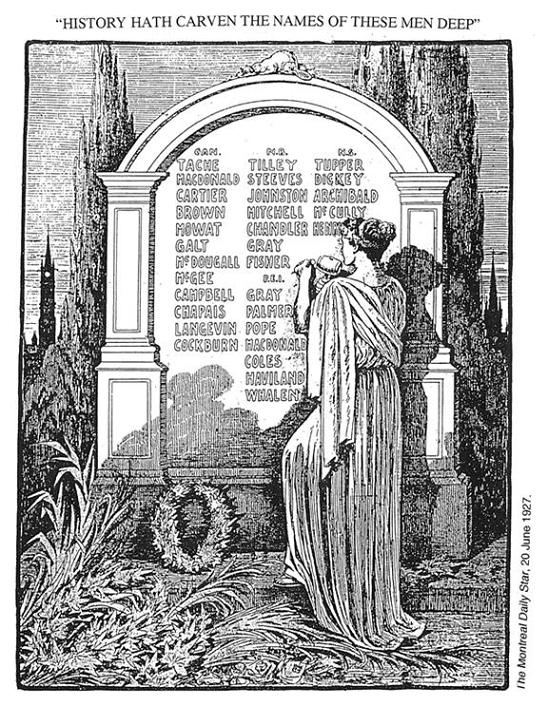
In the Hearts and Minds of the Delegates Who Assembled In This Room on September 1, 1864, Was Born the Dominion of Canada. Providence Being Their Guide, They Builded Better Than They Knew.
Inscription on a bronze plaque unveiled in Charlottetown on July 1, 1927
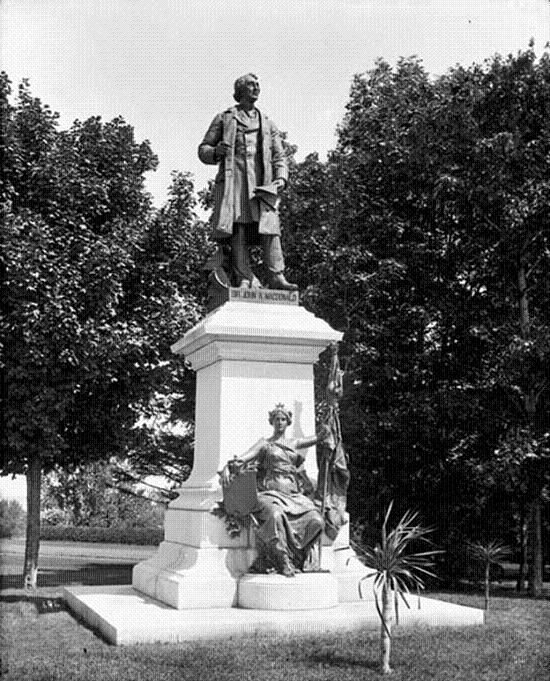
William James Topley/Library and Archives Canada/PA-008927
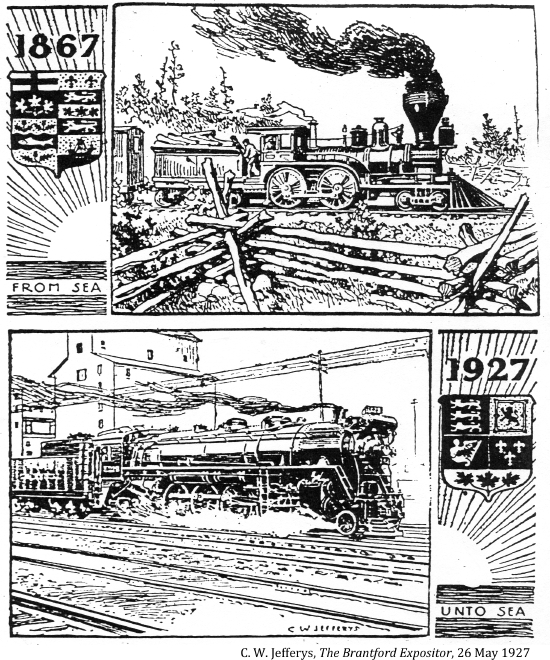
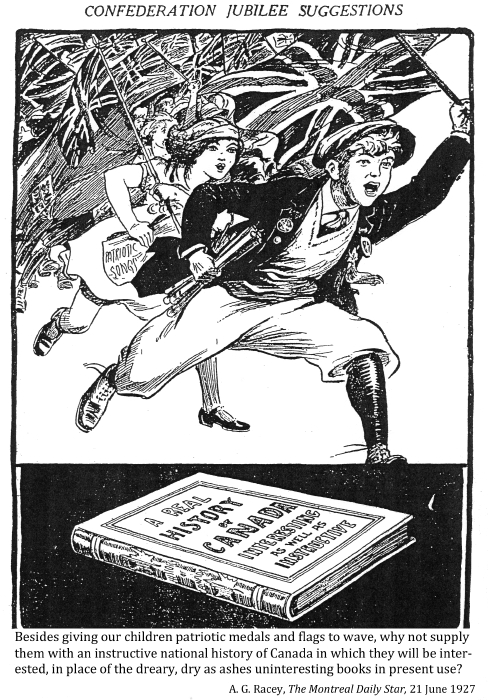
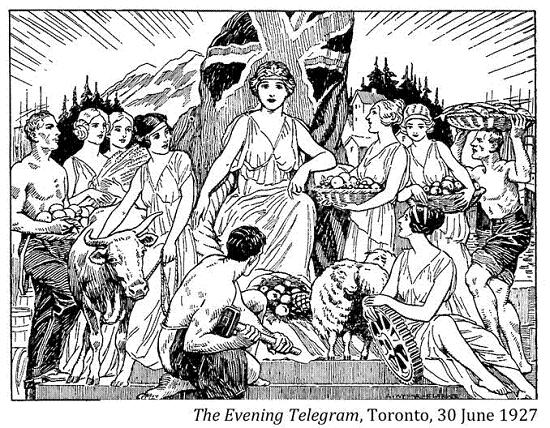
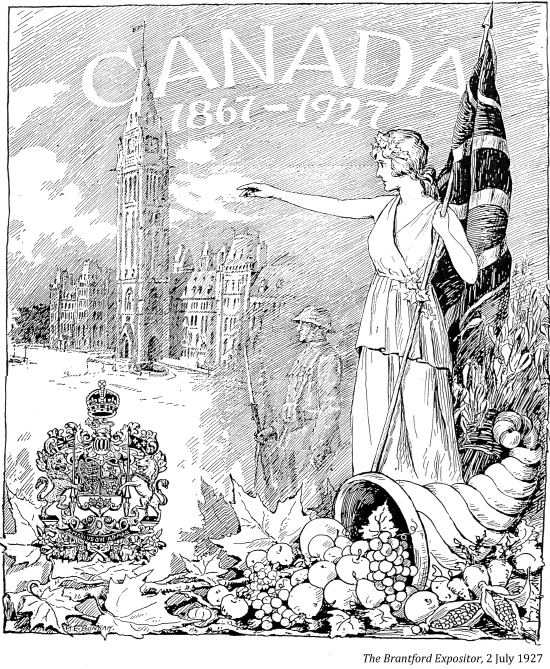
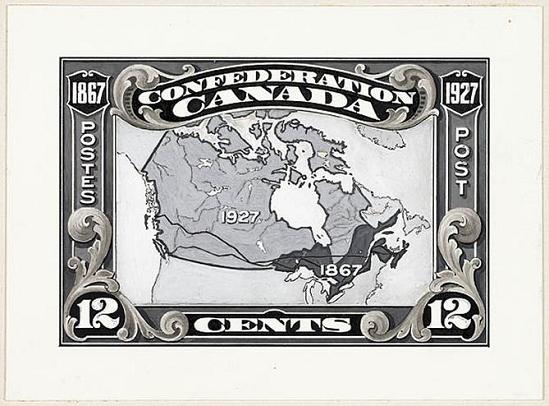
Library and Archives Canada
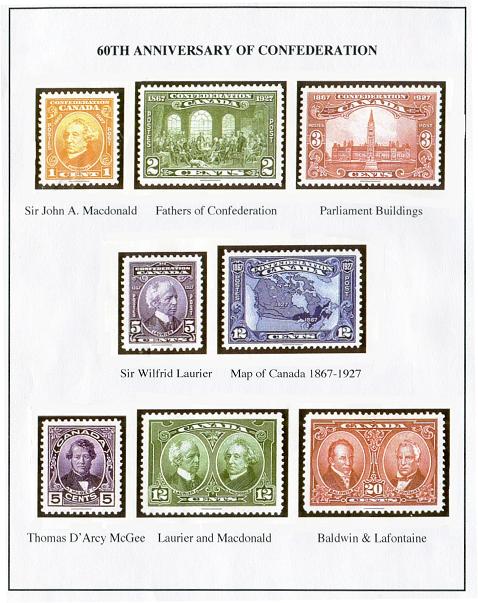
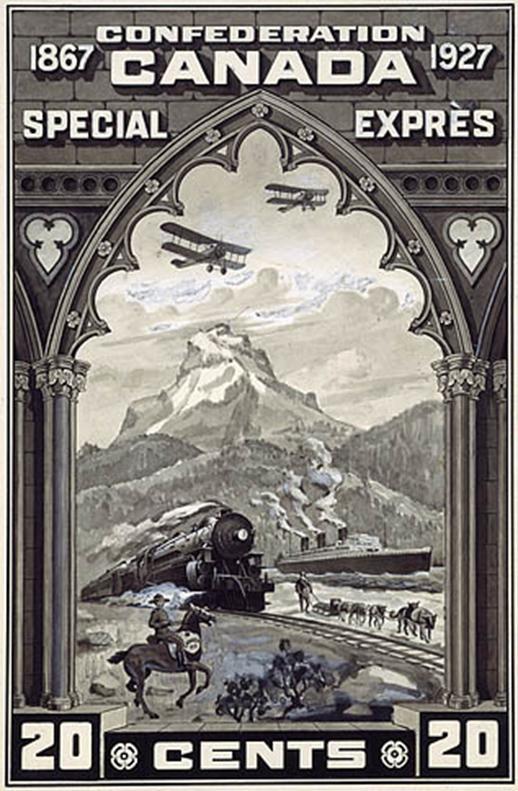
Library and Archives Canada
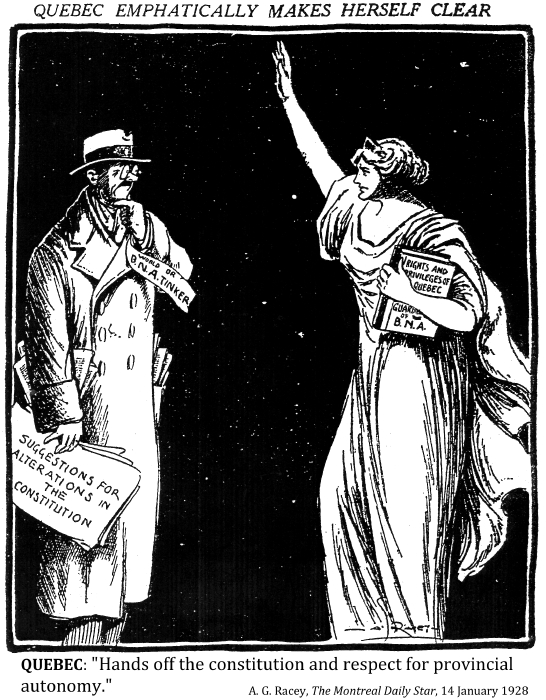
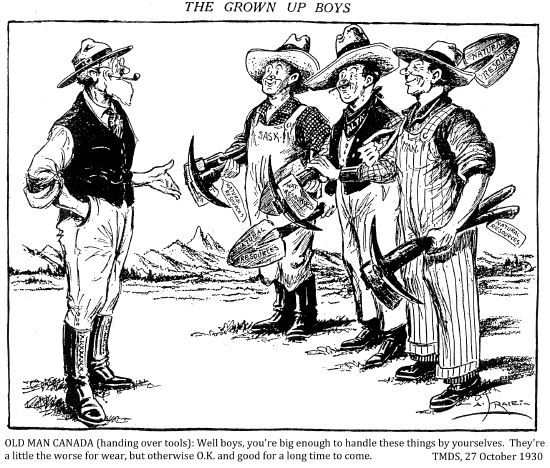
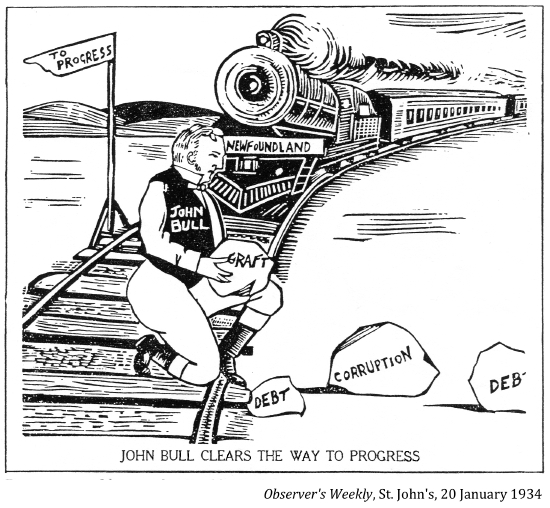

Jacques Gagnier, Le Quartier Latin, Montréal, 22 January 1937
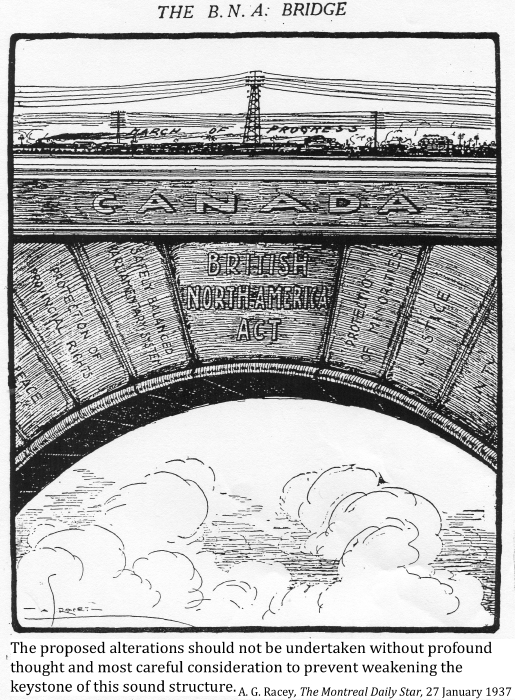
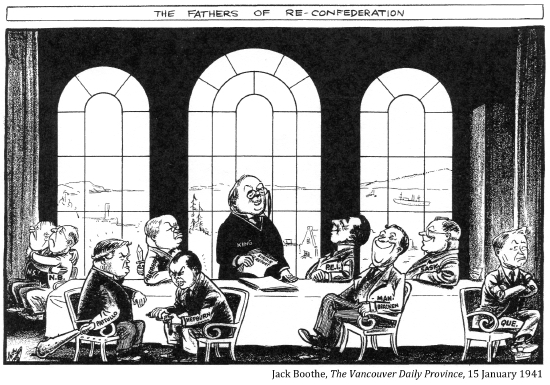
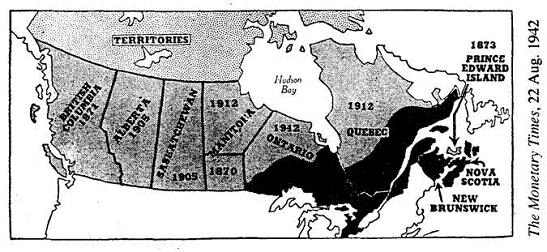
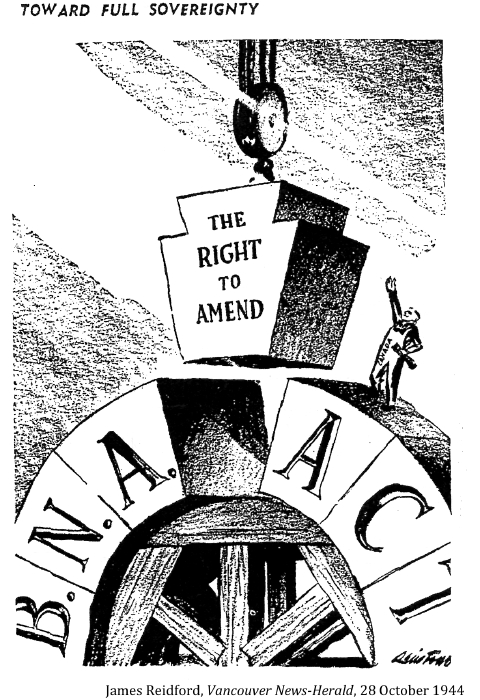
"Confederation had been a political union of several provinces, not a cultural compact between two ethnic communities, English and French.”
Donald G. Creighton, Canada's First Century (1970)
“The Canadian Confederation was nothing more than a vast financial transaction carried out by the bourgeoisie at the expense of the workers of the country, and more especially the workers of Quebec.”
Pierre Vallières, White Niggers of America (1971)
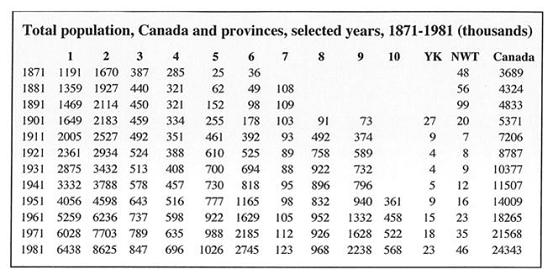
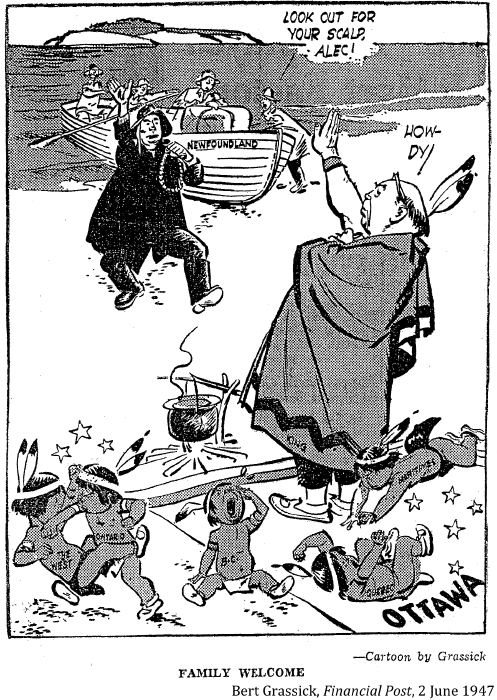
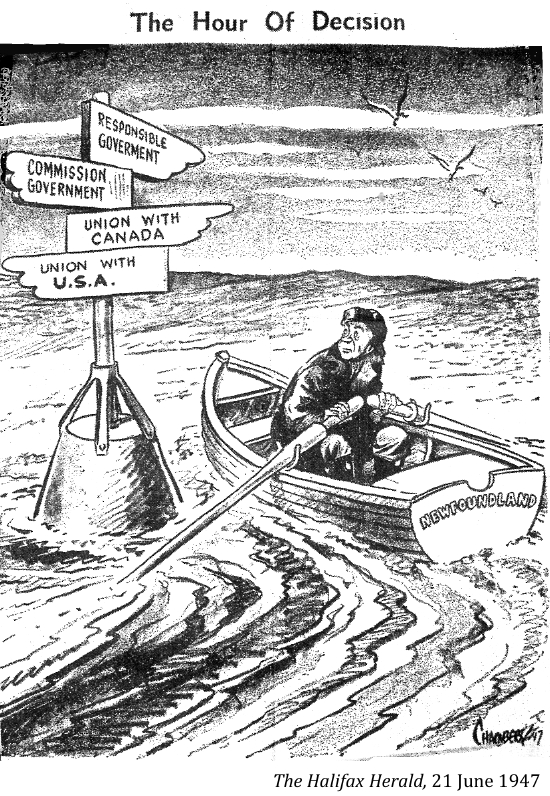
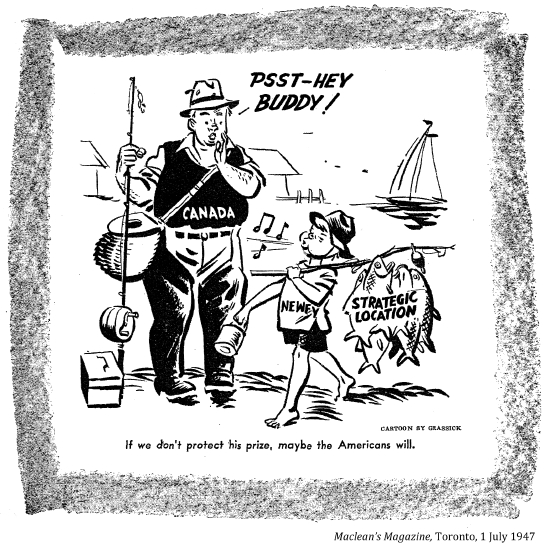
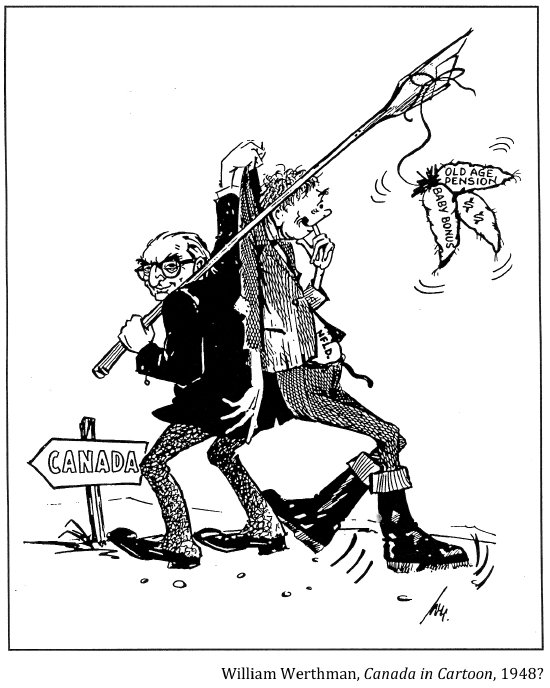
"Newfoundland is the only province of Canada to have freely decided to enter Canada through a referendum."
Brian Peckford, Address, 15 September 1980
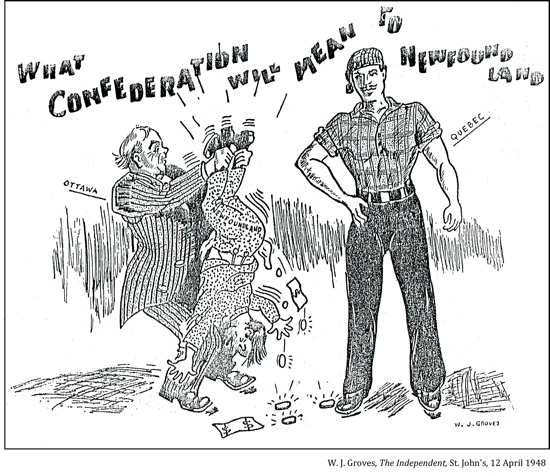
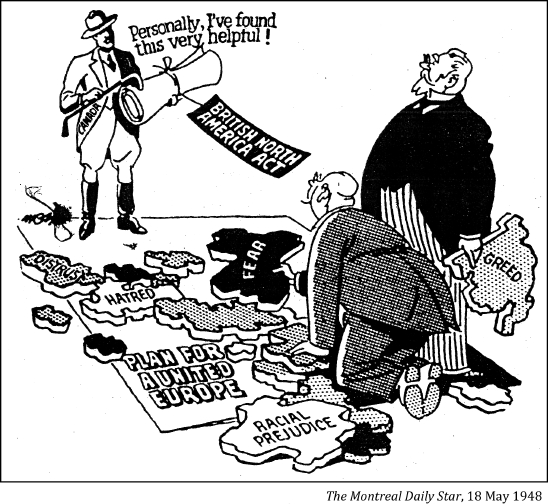
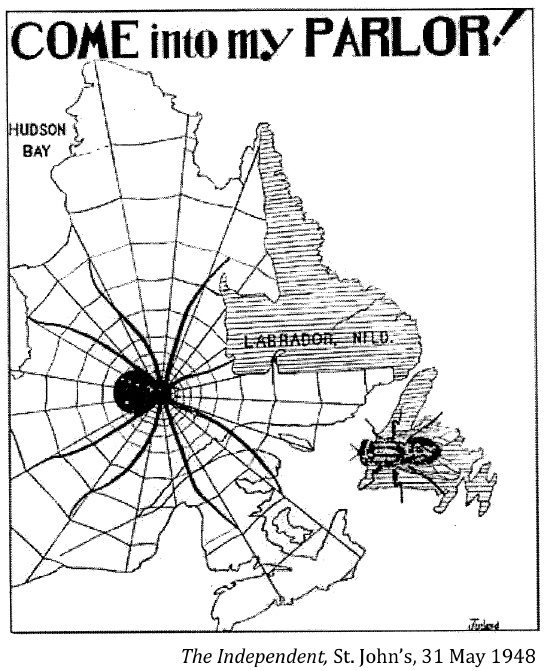
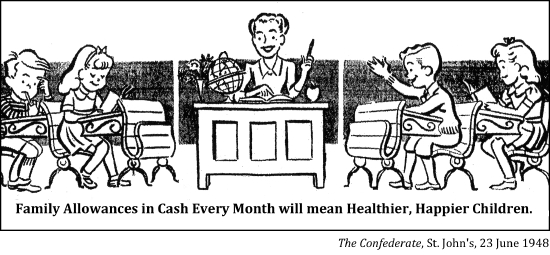
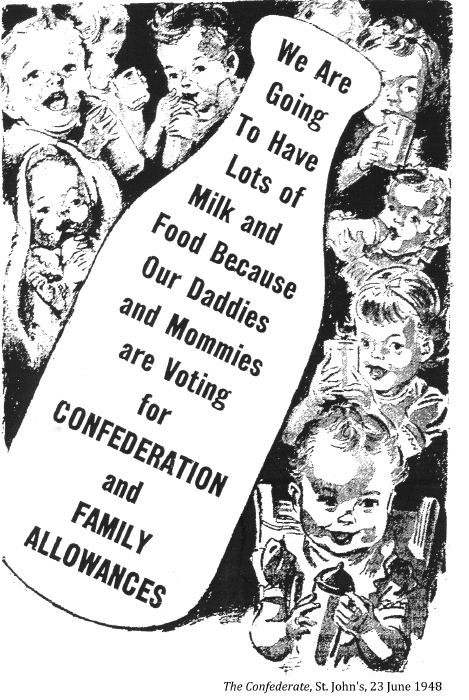
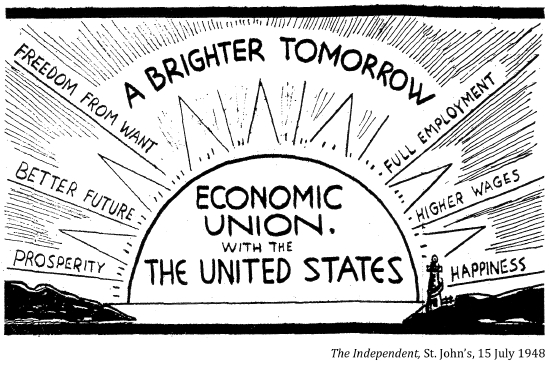
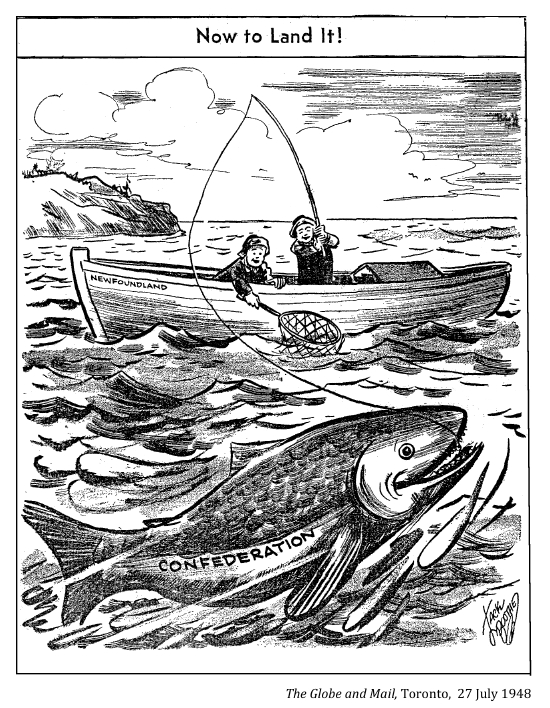
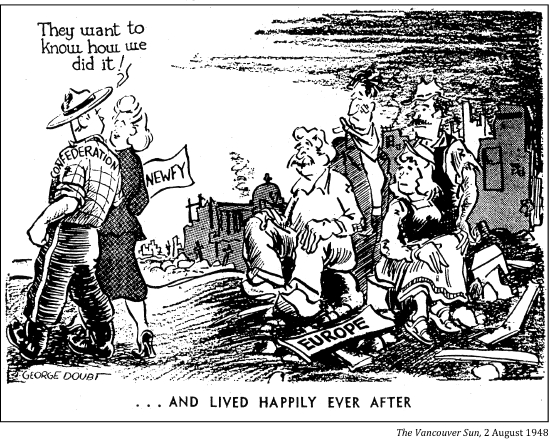
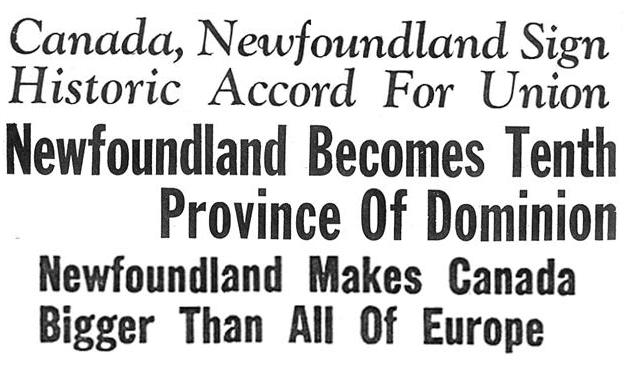
Victoria Daily Times, 11 Dec 1948, 13 Dec 1948, 1 April 1949
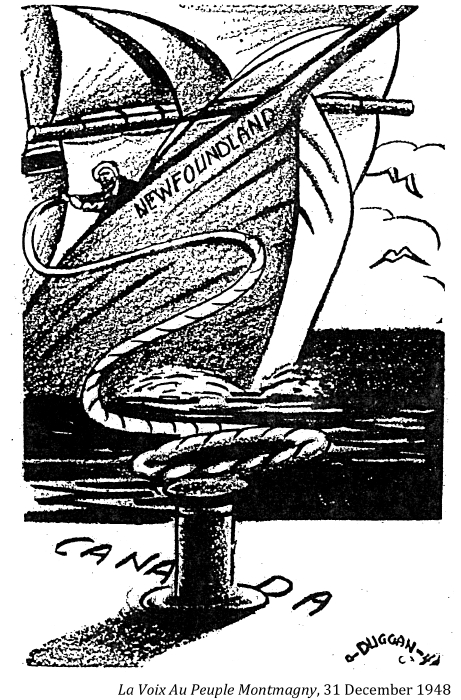
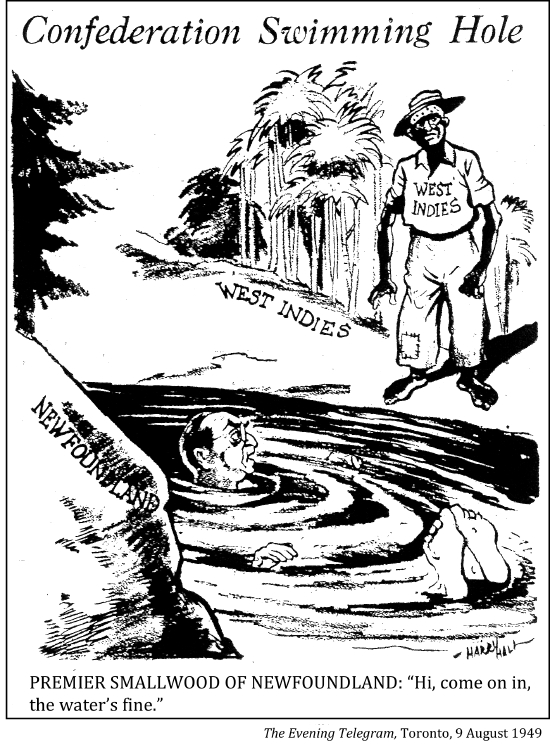
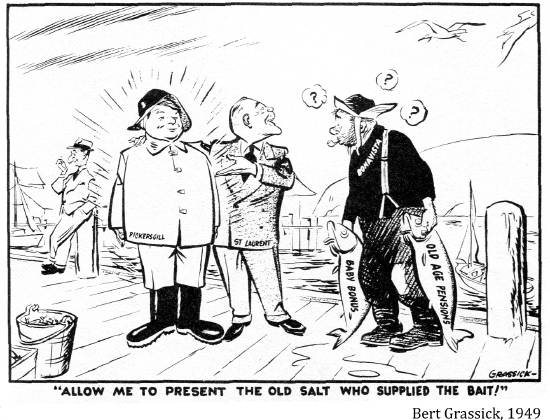
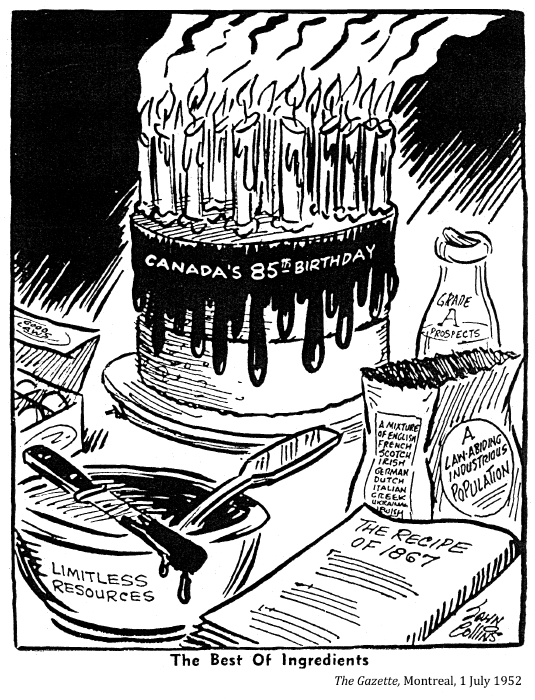
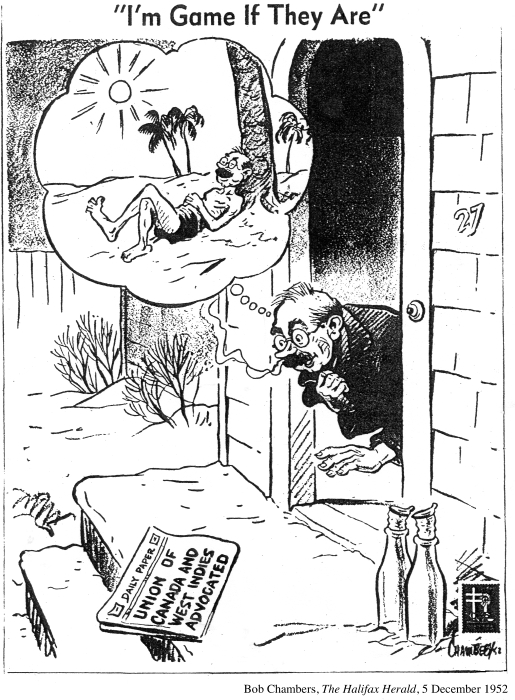
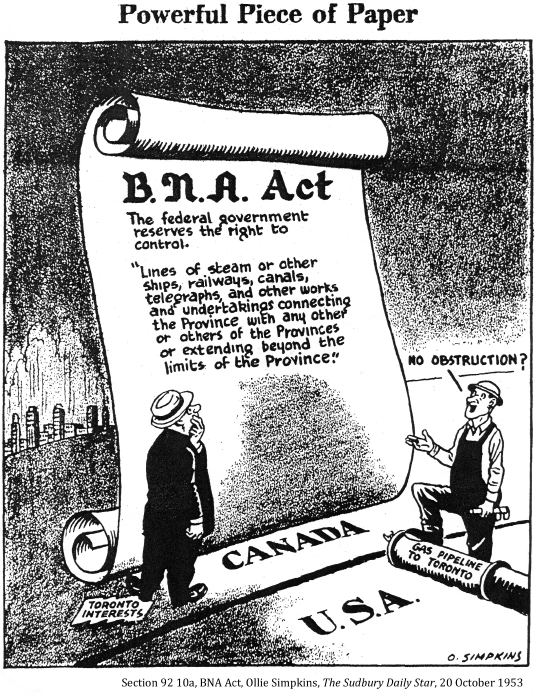
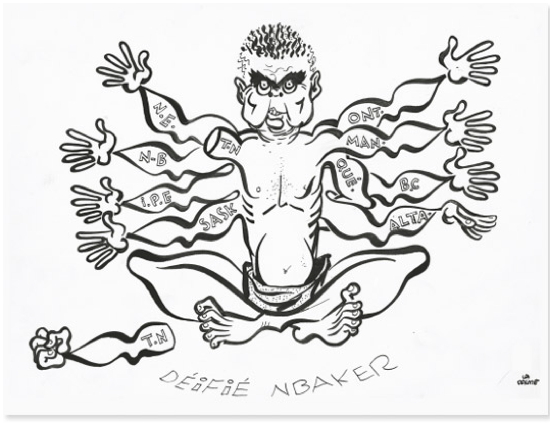
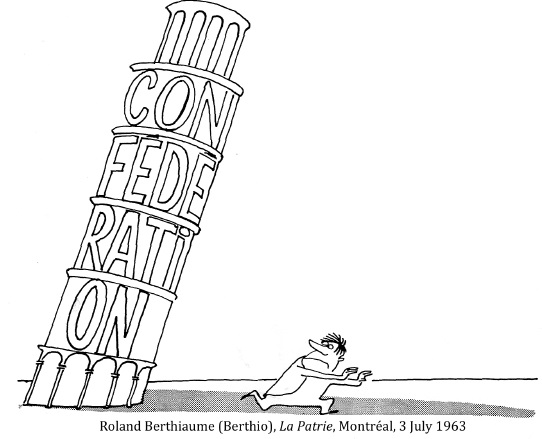
Comme la Tour de Pisa, il penche mais ne tombe pas.
Like the tower of Pisa, it leans but does not fall down.
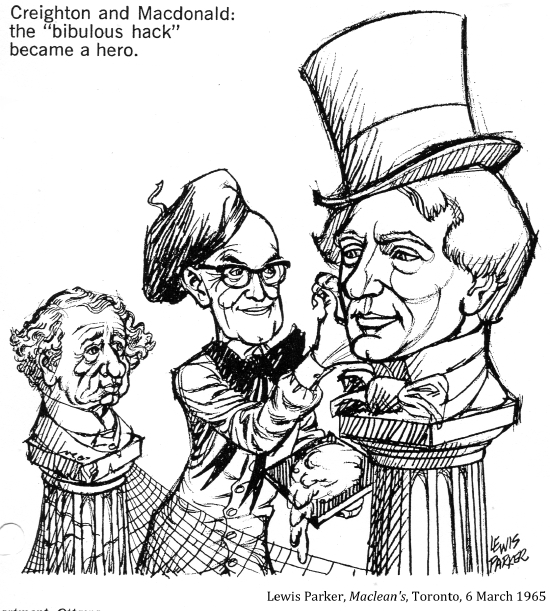

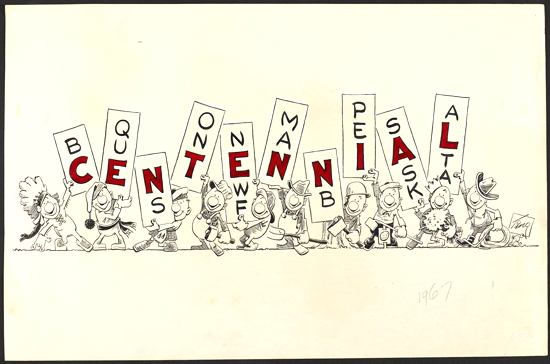
Centennial. Merle Tingley, London Free Press, July ? 1967, LAC, Acc. No. 1989-157-288, 1967
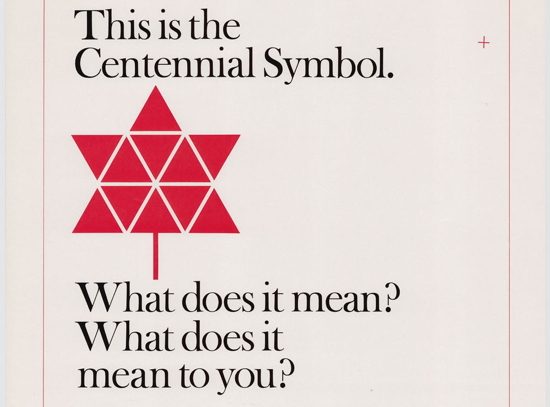
This is the Centennial Symbol. What Does it Mean? What Does it mean to You? LAC, Acc. No. 1984-4-1490 Centennial Commission, 1967
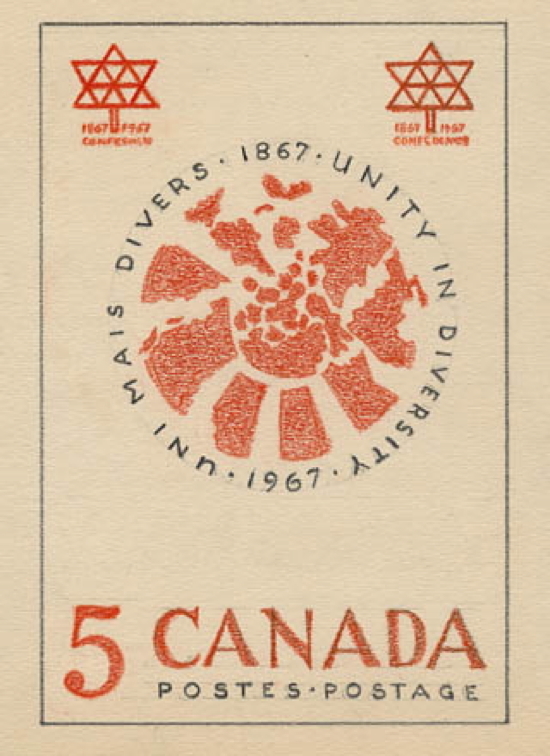
LAC Canada Post Corporation 1967
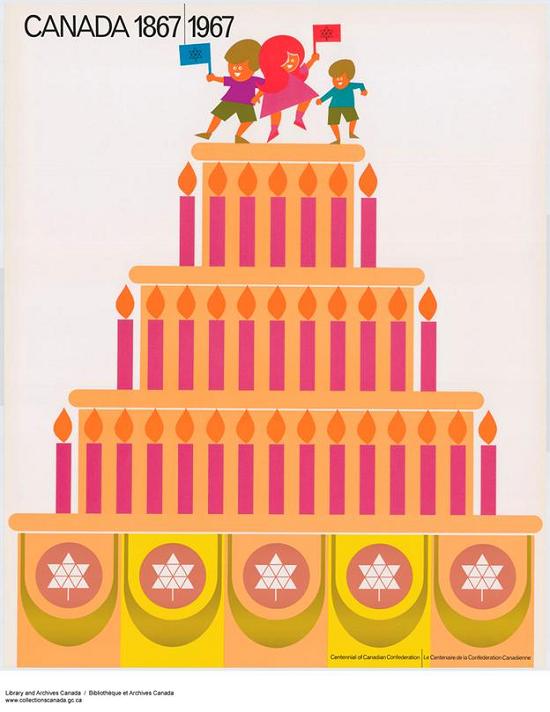
Celebration of the centennial of Canadian Confederation, Library and Archives Canada, Acc. No. 1983-33-1285, C-110376
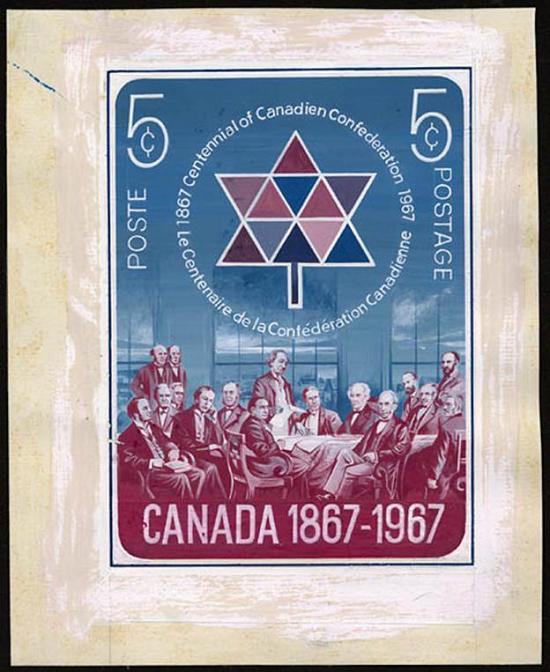
Library and Archives Canada; Copyright: Canada Post Corporation
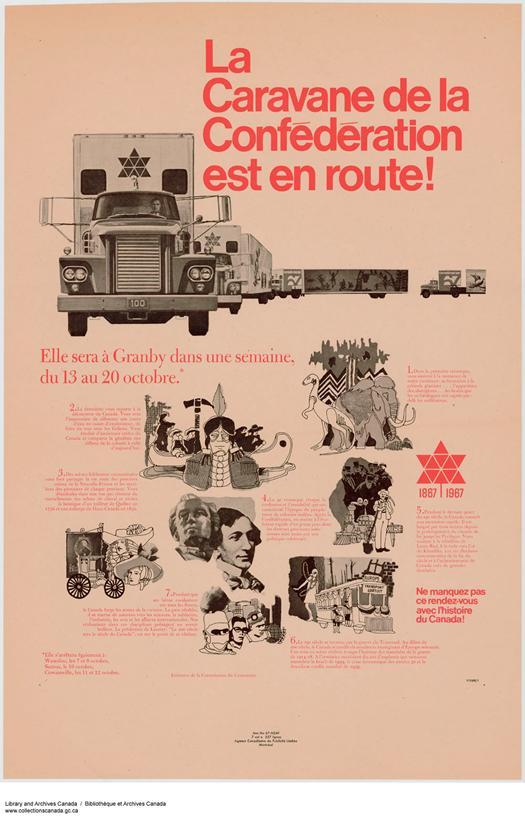
Library and Archives Canada, Acc. No. 1984-4-1458 Centennial Commission
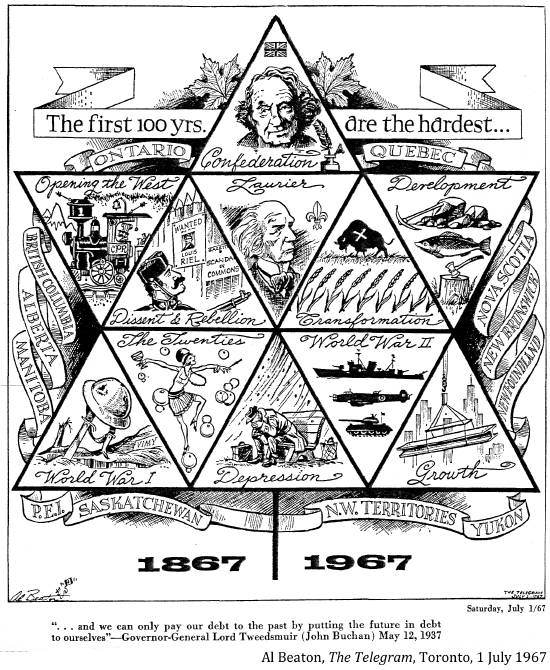

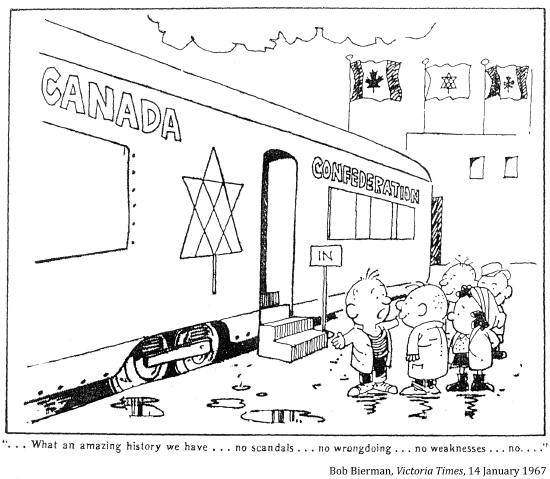
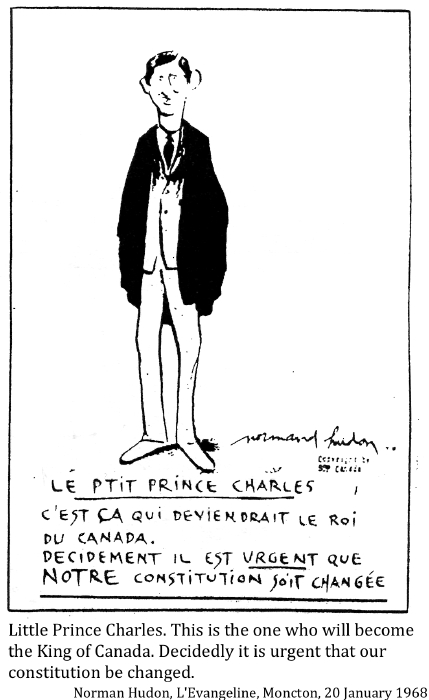
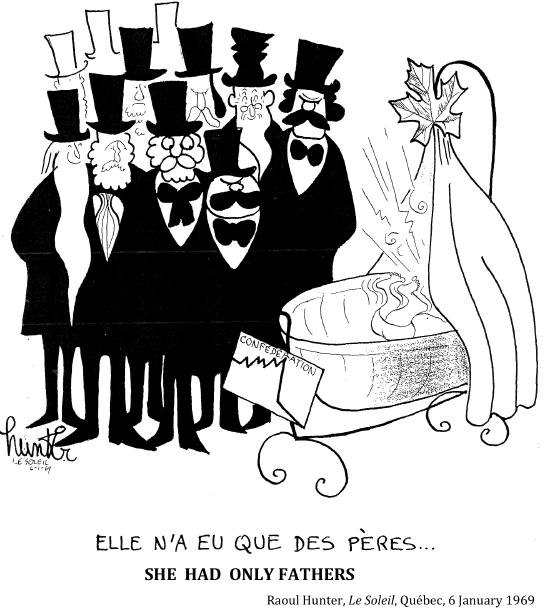
"[In the 1860s] British politicians wanted to shrug off their North American colonies while American politicians gazed north with naked greed,"
Charlotte Gray
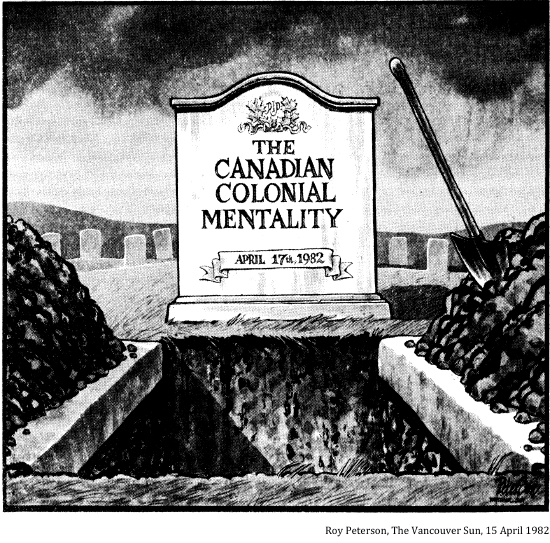
"The genius of Canadian federalism . . . lies in our consistent ability to overcome differences through reason and compromise."
Pierre Elliot Trudeau, Address, 17 April 1982
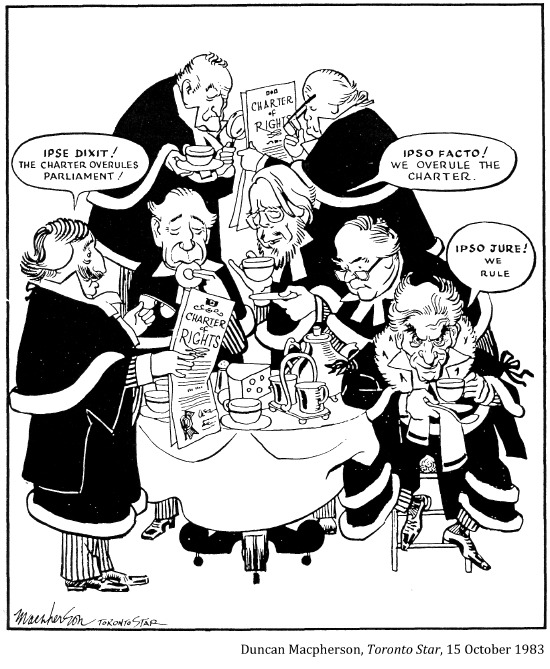
"We have in Canada the ability to bring together two European peoples, complemented by cultures from all around the world, with an indigenous population that has been here for tens of thousands of years. We have the ability to create a culture that will be different from others because we will take from each other and we will give to each other, but we will not have to crush each other."
George Erasmus, speech after Oka, 29 November 1990
"Since Confederation seven generations of Canadians – French-speaking, English-speaking, and immigrants from around the world – have flourished, economically and culturally, under a regime of peace, order and occasional good government. To throw this lightly away is a folly almost beyond belief."
Michael Bliss, The Toronto Star, 20 May 1994
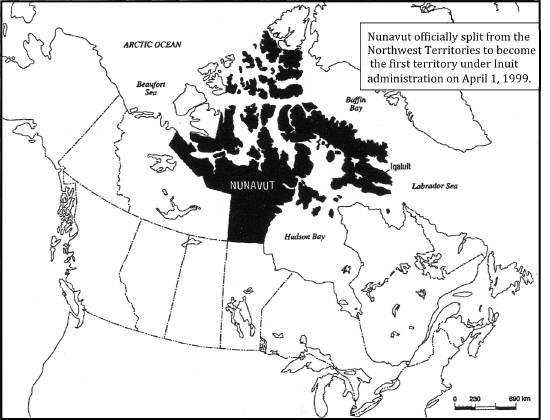
[The creation of Nunavut meant that Inuit people could have a say in government decisions, including preserving their language and way of life. 1 April 1999]
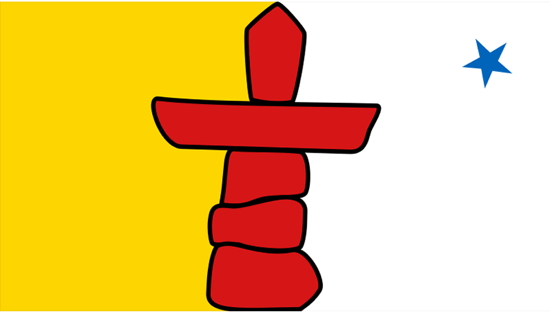
Flag of Nunavut, 1 April 1999
"We are one of the oldest democracies in the world – 152 years without a civil war or coup d'etat. Look around at our allies. Compare."
John Ralston Saul, The Globe and Mail, 24 March 2000
"The Clarity Act of 2000 permits any province to hold a referendum on separating, and if a clear question elicits a clear response then Ottawa is bound to negotiate a parting of the ways in good faith."
Michael Bliss, National Post, 8 January 2005
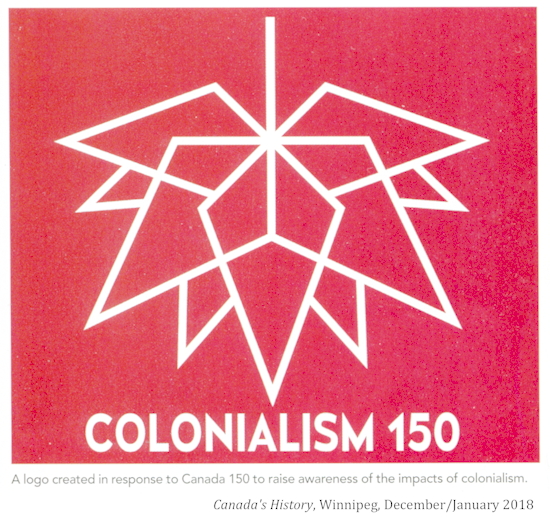
"I do not wish to celebrate Canada stealing our land. That is what Canadians will be celebrating on July 1, the theft of 99.8 per cent of our land, leaving us on reserves that make up only 0.2 per cent of the territories given us by the Creator."
Arthur Manuel, 2017
|














































































































































































































